#gynophobia character
Text

Today’s disabled character of the day is Jiro Sakana from Sakana, who has gynophobia and general anxiety disorder
Requested by Anon
[Image Description: Drawing of a man with black slicked back hair with a small black pony tail. He is wearing a blue short sleeved shirt with a shark face on it, jeans, chain wallet, black watch on his right wrist, and blue shoes.]
20 notes
·
View notes
Text
b00ba jumpscare

Usually I post art on Instagram first but I wanna make a goofy ass sketch to go with this so I'm posting this monster OC here first lol
Her name is Eve and she's a physical embodiment of the fear of women AKA gynophobia. She's also oddly peaceful compared to her fellow Nightmares and would rather daydream about having a child and ponder philosophical questions over mindlessly assimilating other Nightmares to grow stronger or humans with gynophobia.
#oc art#original character#monster girl#monster oc#oc artist#original art#digital art#digital artist#artists on tumblr#spooky#creepy art#cw body horror#cw suggestive#gynophobia#fear monster#horror monsters#horror
1 note
·
View note
Note
Hi! Absolutely adore your DBZ analyses, thank you so much - just spent a delightful time reading them all. I was wondering, since you've commented on Chi-Chi and Goku's marriage, what do you have to say about Vegeta and Bulma's relationship? (I've always been entranced by it - mostly because as with all his romances, Toriyama had the wisdom not to show any of it onscreen. But I'd love to know your thoughts about it.)
Bulma and Vegeta are a match made in Hell, and they deserve each other. (Which is to say yes, I love this ship.)
Hooking Bulma up with Vegeta was a hell of a narrative swerve. Generally speaking, stories rarely do this; They rarely let characters break up once they're already invested in a romance, unless it's supposed to be like a love triangle thing.
And Bulma? Bulma was invested. At least, to a degree.
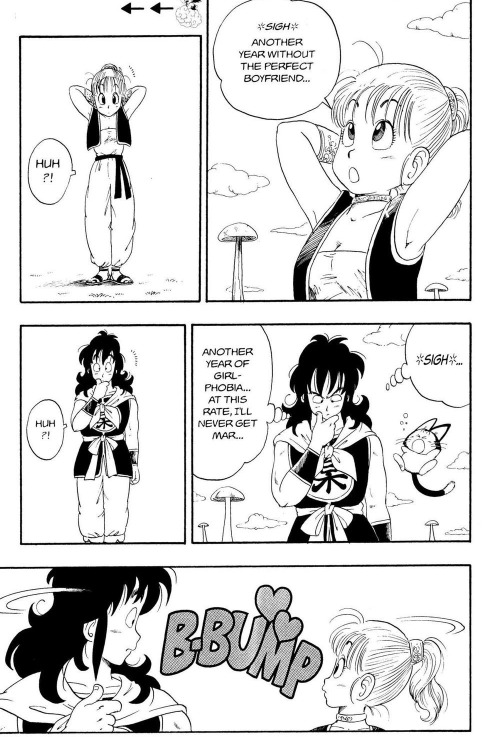
This was the birth of the original Bulma romance that ran through about half of the manga. Two teens interesting in the opposite sex suddenly realize the availability of the other and a relationship is born.
Toriyama says he's bad at writing romance but to be honest, this has always hit me as more believable than your typical drawn-out five-seasons-of-pining Will They/Won't They affair. I'm a girl. You're a boy. Wanna go out and see what clicks?
And these two... these two do not click. We only really see their relationship from Bulma's perspective but it's clear that these two are miserable together.
The manga sorta takes Bulma's side, in that we never really get to hear Yamcha's opinion about their relationship one way or another. When he's around, all he wants to do is talk shop about martial arts. Since Toriyama doesn't like to write romance, we simply don't see much of it from them. What little we do hear about it comes from Bulma complaining about how miserable she is.
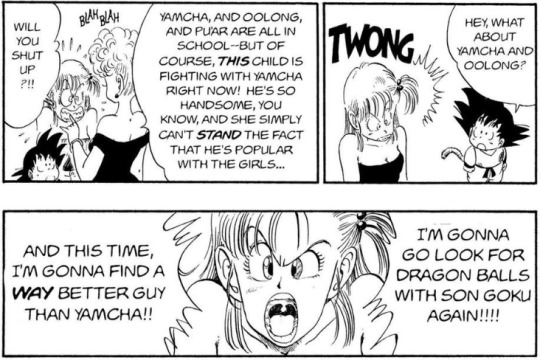
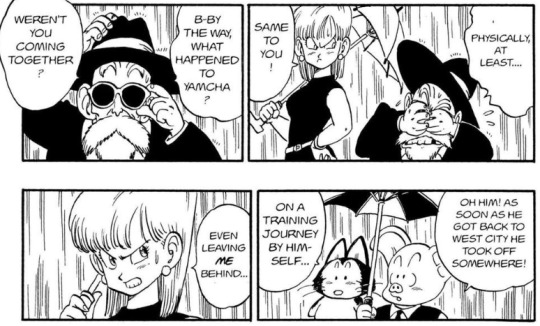
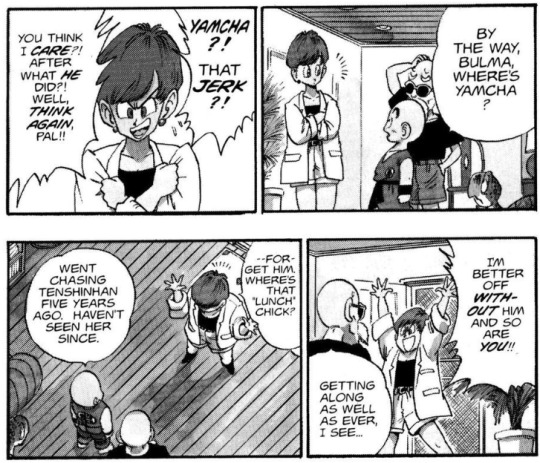
Bulma is pretty much always pissed off whenever the relationship is in focus at all.
Anime filler tends to take Yamcha's side instead, portraying him as a put-upon victim of Bulma's jealousy and abuse. A nice guy who doesn't deserve the way she treats him.
It's not hard to buy into this interpretation of their relationship since, as noted, we rarely get anything from Yamcha with regard to his relationship to women or Bulma specifically but we know Bulma's a lot. It's easy to accept Bulma as the "bad guy" of this relationship because. Like. Remember that time she enslaved a sentient being? Good times.
Though one particular moment from Yamcha later on kinda stands out as a bit of a retroactive Yikes.
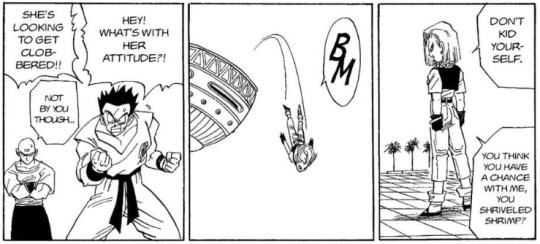
Yeah. Uh. Threatening violence against a woman for rejecting his bro is a bit of a Yikes. Is this who we were supposed to see Yamcha as all this time? Because, if so, it might have helped to let him opine about the relationship more. Just saiyan.
According to Toriyama in interview, Yamcha and Bulma ultimately broke up because she caught Yamcha cheating on her. I guess that's what him being "popular with girls" was supposed to mean: Once he got over his gynophobia and found confidence with the opposite sex, Yamcha became a player.
But that doesn't necessarily come across from the statement, "Bulma can't stand that Yamcha's popular with girls." A lot of fans took that to mean girls just like him for no reason, and Bulma's unreasonably jealous about it. The anime took that position too.
Note that the "Yamcha is popular with girls" thing isn't helped by the fact that we never see it on-panel because he's only ever talking shop when he's around. But we do see a wandering eye from Bulma often enough.
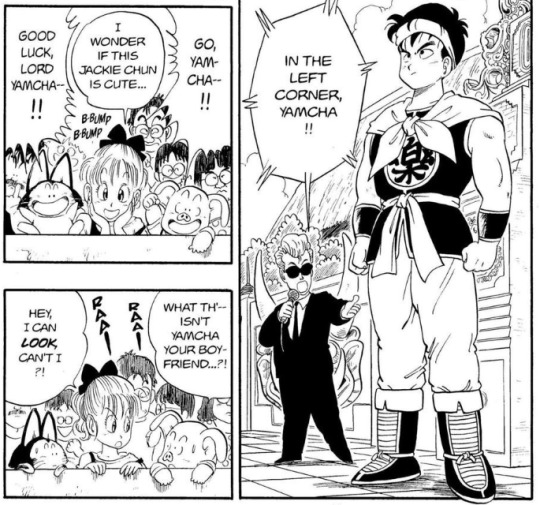
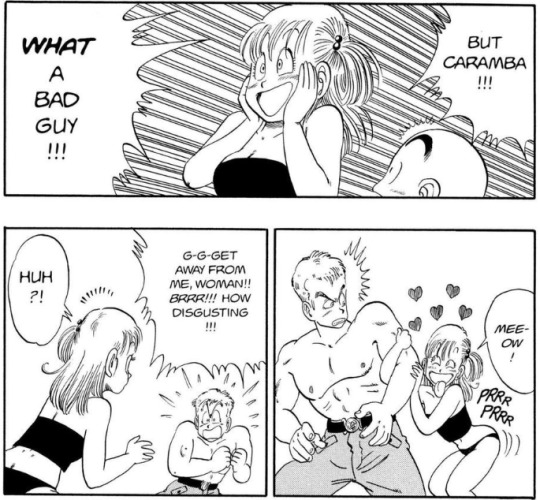
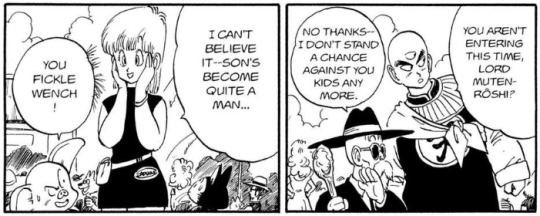
There's nothing wrong with enjoying the aesthetic appeal of another party even when you're in a monogamous relationship, but it doesn't really present the "Other party is a womanizer and cheater" case when you're the only one ever seen doing this.
So it feels like there's a lot about Yamcha and Bulma's relationship that never made it to print yet influenced later decisions. Those decisions ended up being controversial because the foundation for those decisions was never laid. Here, Toriyama's disdain for writing romance worked against him.
But ultimately, regardless of whose side you take, it doesn't really matter. It doesn't matter who the "bad guy" is. A healthy relationship does not have a "bad guy" in it.
Whether or not Yamcha cheated, whether or not Bulma's just an unreasonably jealous hell-beast, it doesn't actually matter. What matters is that once you reach the point where you're taking sides over which party is the most obnoxious asshole and I hate you and I wish we never met... this relationship is not working for anybody.
It doesn't matter who the bad guy is. It doesn't matter who deserves the blame for this relationship being a toxic shithole. That there is blame to throw around in the first place is the problem. Every relationship has its ups and downs but if one party is constantly miserable for years and has possibly been looking for an escape hatch since year 1, that's not a little tiff.
What matters is that these two are not working out. Any time we see their relationship in focus, they are miserable together. The anime tried to do some patchwork on that with audience reception by giving them some cute moments as well, but because those moments aren't canon the pair remained miserable.
And then this happened.
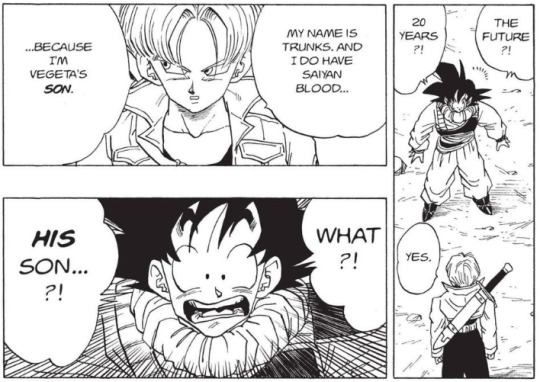
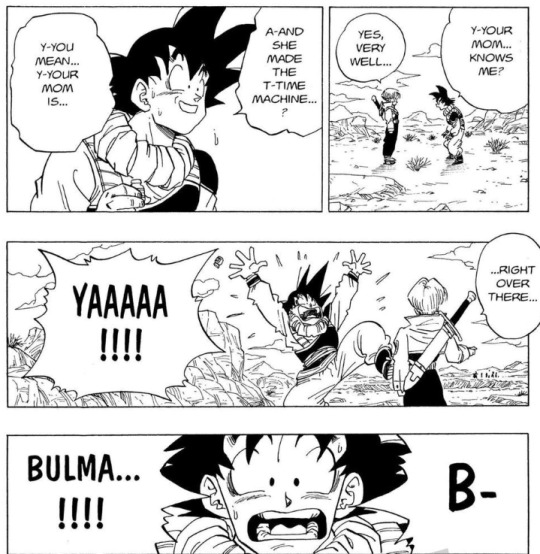
Despite everything, I think we all assumed that Bulma and Yamcha were going to work it out. Fictional relationships are often portrayed as tumultuous. To a writer, nothing says true love like being constantly miserable and despising every waking moment you spend with your awful, nagging ball-and-chain of a spouse. That's just. Like. What the straights think romance is. It's weird.
I think we all thought that was going to be the deal here too. And then Trunks came along and said, "Nope, actually, they finally severed the cord."
Again, Toriyama says he's bad at writing romance but holy shit, the toxic and miserable relationship actually ended. The two characters involved who only got together out of loneliness and desperation later found they were incompatible with each other. That's so real. Much moreso than a lot of fictional romances.
Instead, we got the absolute crack ship that is Vegeta and Bulma. What a wild-ass revelation for Trunks to drop.
Like. Until the end of the Namek arc, this was the only time these two characters even met.
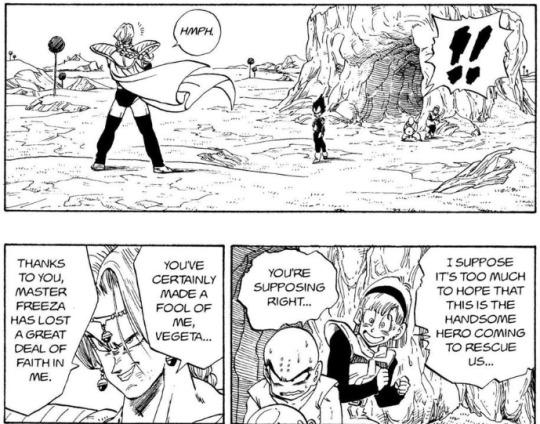
She also saw Vegeta for like two seconds here.
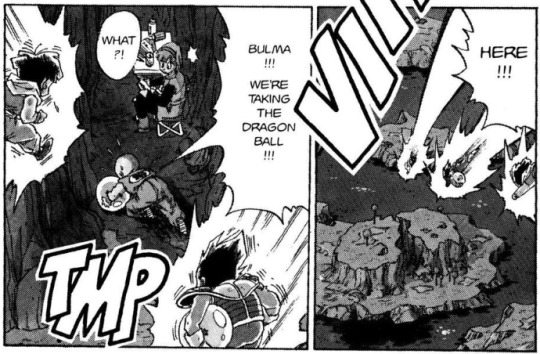
That was it. That was their entire history together until Goku defeated Frieza while Kaio sent everyone to Earth. But that's when everything changed for Vegeta.
Stranded on Earth with no ship, no affiliations, no ability to leave the planet and nowhere to go or be and no obligations to anyone but himself, Vegeta's circumstances were wildly different than they'd ever been before. He had become one of the Namekian refugees.
And Bulma was offering refuge.
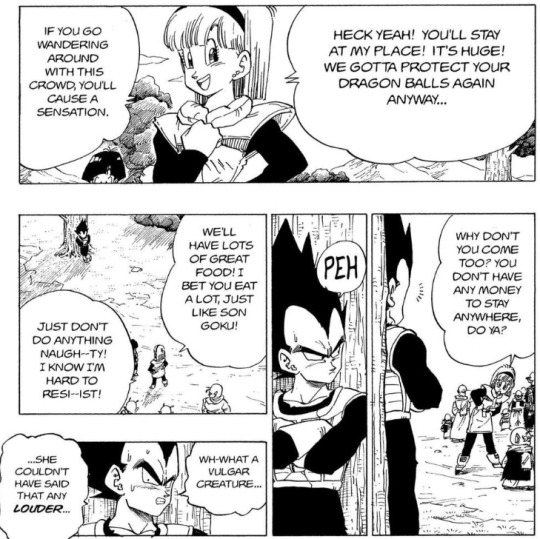
Hard to resist, indeed. That moment is absolutely hilarious in retrospect. Bulma rolled a Nat 20 on that charisma check. It's pretty clear who the instigator of this relationship was.
Like. It needs to be stated that at this point, the only thing Bulma knew about Vegeta was that he tried to kill them all multiple times, and also he's kinda hot. But. Like.
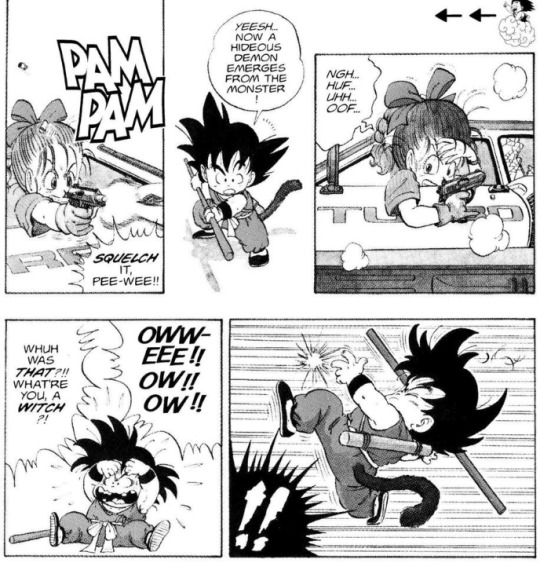
It's Bulma. Anyone who doesn't expect this from her by now either hasn't been paying attention or started watching the English dub of the anime when they did Z first.
So, naturally, Vegeta is a kind and loving man and became a phenomenal husband and fa--
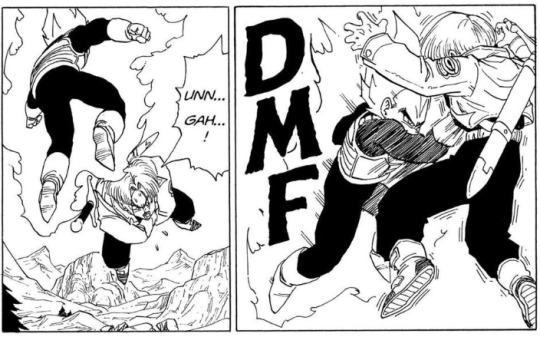
Wait. No. I got my notes mixed up. It says here Vegeta's a rotten dirty bastard. Like. Chronically. He has Supreme Dickshit Syndrome. It's genetic.
Most of Bulma and Vegeta's developing relationship happens offscreen. From what snippets we get, Vegeta has a tendency to vanish during the day, but he still lives at Capsule Corp so Bulma sees him around.
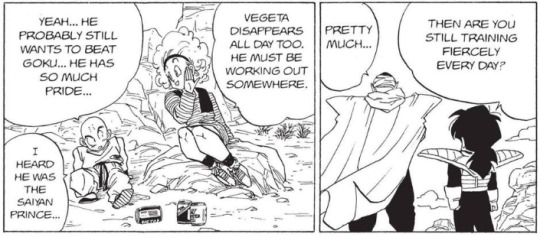
By the end of the three-year timeskip, it's official. Or semi-official. Yamcha and Bulma broke up at some point during that timeskip and Bulma's given birth to Trunks.
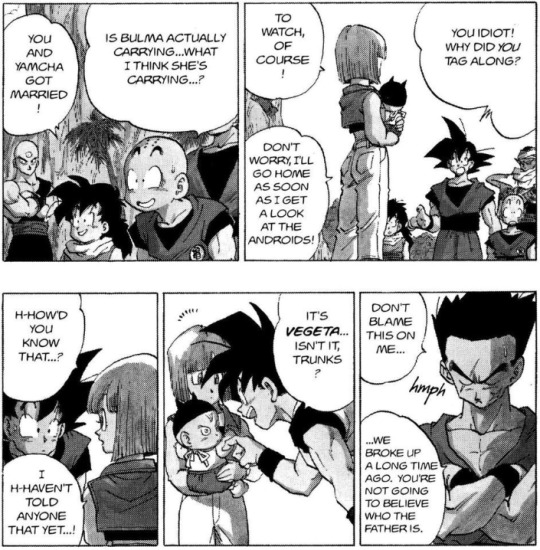
As for Vegeta, he's evidently moved out of Capsule Corp and into his own place.
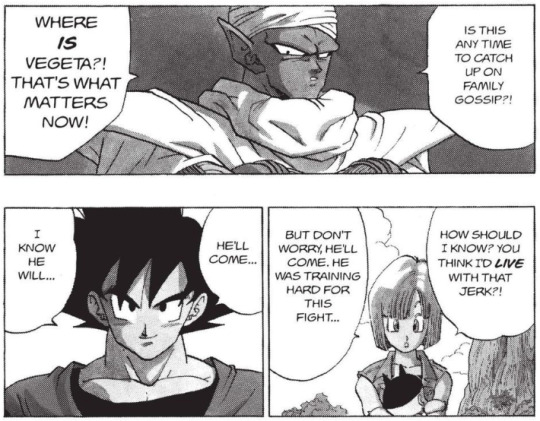
I guess he's still keeping contact with Bulma since she knows what his intentions are. Not to mention he found his tranquility during these three years, though it's somewhat ambiguous as to what exactly brought that peace to his heart.
But the relationship is off to a rocky start nonetheless. Clearly something went down between Vegeta and Bulma that drove Vegeta out of Capsule Corp. To. Uh. Somewhere.
I like to imagine Vegeta living in some shitty West City apartment he rents off a stipend Bulma's sending him that he refuses to openly acknowledge. Like, room 101 is a down-on-his-luck tax accountant, room 102 is a couple with a kid trying to make ends meet off two retail workers' salaries, and then room 103 is Vegeta, Prince of All Saiyans. Sometimes he goes to community events and pretends he isn't having fun.
No lie, I would absolutely watch that as a sitcom.
As for Vegeta himself, he's still a rotten dirty bastard.
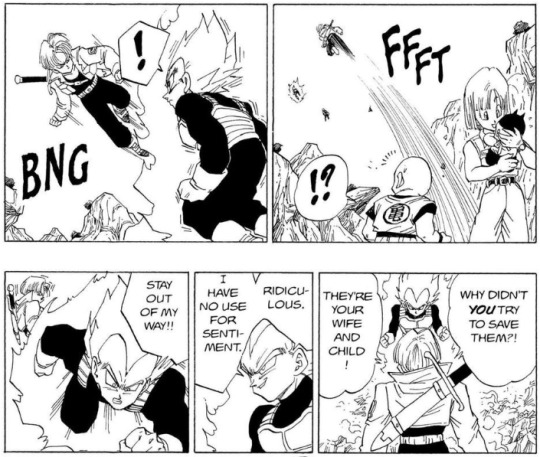
Worth noting that Vegeta's saying this as a Super Saiyan which means he's drunk on the form's enhanced aggression. But. Still. Vegeta is an absolute monster being dragged kicking and screaming into a pleasant life that he'll one day resent himself for enjoying. This is his arc moving forward.
It's not so much a redemption arc as it is a domestication arc. The uniquely evil even by Saiyan standards Vegeta is gradually being changed by his new terrestrial life. He doesn't want to own up to how much he enjoys it here. Seven years later, he's still desperate to avoid owning up to it.
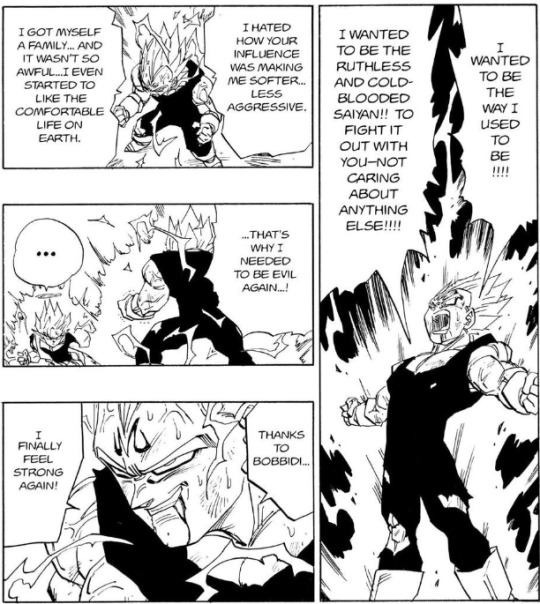
He doesn't want to be happy here. He doesn't want a loving wife and a son who looks up to him and the most lavish home wealth can afford him and easy, comfortable days spent with friends and loved ones by his side. He doesn't want a happy ending.
But it's like Bulma warned him: Dragon Ball's queen bee is hard to resist.
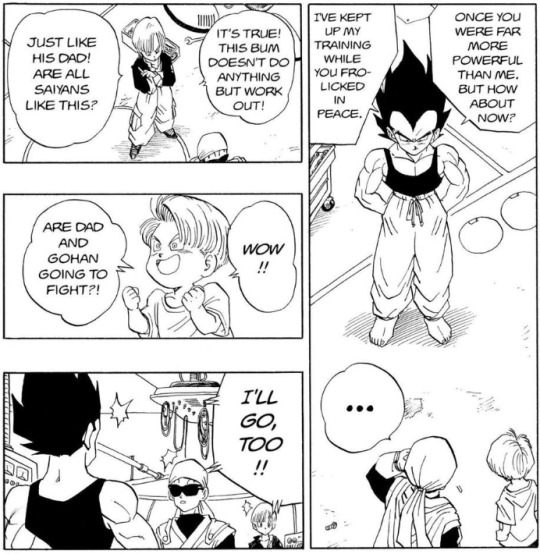
Welcome back to Capsule Corp, Vegeta. We hardly even noticed you were gone. Honestly, Future Trunks deserves a lot of the credit for this; Watching him die at the Cell Games was what flipped the switch in Vegeta's head that he wants the family he and Bulma have spawned together.
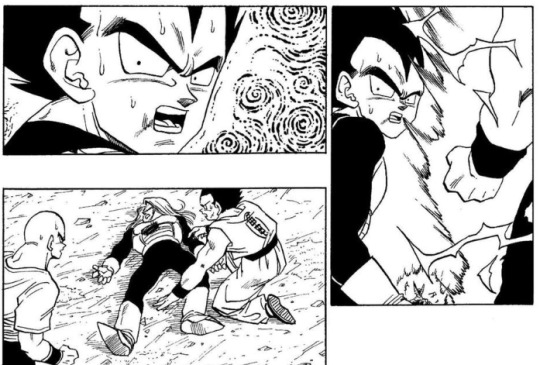
Sure is a good thing we have Dragon Balls because this is a hell of a time to suddenly decide you love your son. But we see the consequences of that seven years later, since Vegeta moved back into Capsule Corp from... I don't know, wherever he went. They're gonna miss him at the next community poolside summer BBQ event for all tenants.
Part of what makes Vegeta and Bulma work, I think, is that they're on the same page about one crucial point. For Bulma, there is one person who will always take precedent in her life above all others. Romance comes and romance goes, but this is the relationship that matters most to her.
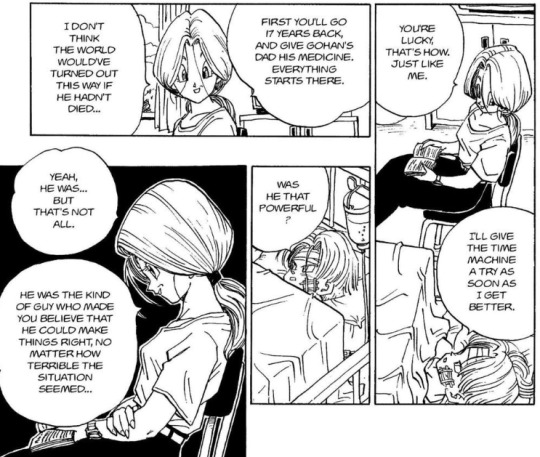
Especially when it comes to martial arts and fighting. Bulma doesn't know a lot about the subject, but she knows that Son Goku is her #1. She has no reservations about saying that to her lover's face either.
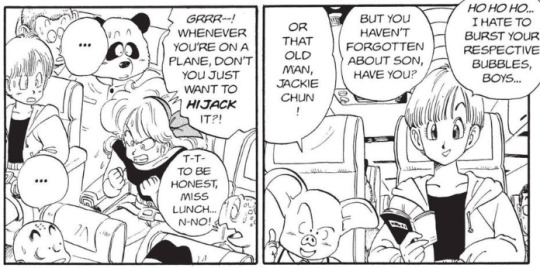
When fists start flying, Bulma knows who she's rooting for. If Goku's involved, then it's not her guy. That's. Just. Something that anyone who wants to be with her has to be willing to understand. The single most important relationship in Bulma's life will always be her friendship with Goku.
And the thing about Vegeta is... He kind of agrees? Like. See above, re: I wanted Babidi to destroy my feelings for Bulma so that I could become the warrior that can fight with you, Kakarot.
As much as Goku will always be Bulma's #1, he'll also always be Vegeta's #1. He even gets included into Vegeta's fond farewell to the family he loves.
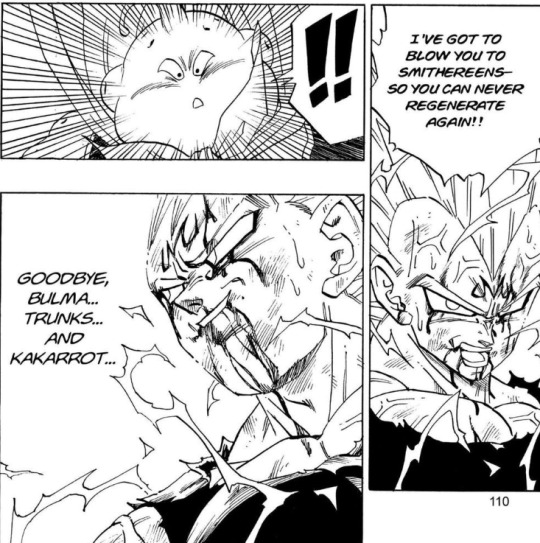
Goku is basically the platonic third in a two-person polycule. This is the second marriage that this poor ace plays a vital role in despite having no real interest in romance whatsoever.
Bulma is selfish, spiteful, petty, and vain. At one point, DBS: Broly directly compares her to Frieza; A comparison that manages to be unbelievably unflattering to both participants.
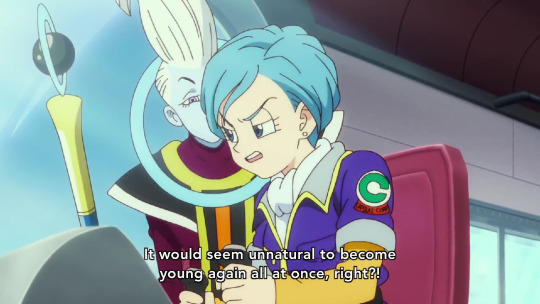
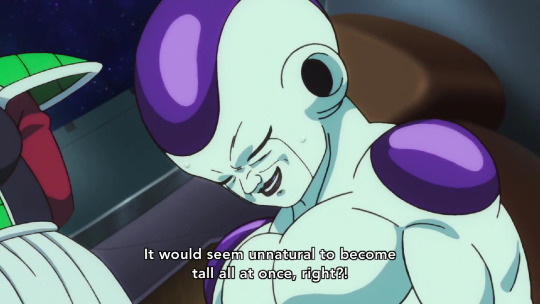
They're the same picture. A revelation that would probably be horrifying to both.
And Vegeta. Especially Vegeta. But. Like. She warned you she was irresistible. You didn't take her seriously and now look where you are. Married to the She-Frieza. Maybe you should think about your life choices.
This is just. So much fun. As I said at the outset, Bulma and Vegeta are a match made in Hell who make it work because they're both similar brands of awful.
As for Yamcha, it's a little known fact but Yamcha rebounded and moved on with his life. He stops having much story relevancy after he leaves Capsule Corporation so we see very little of his private life from there. After retiring from martial arts and splitting up with Bulma, Yamcha's left without any story hooks to keep him involved.
But there was this interesting moment, when he realized they had a Shenron wish to spare.
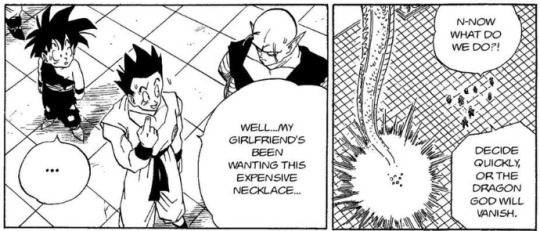
After Krillin comes up with something better to use the wish on, he takes it back and claims it was a joke.
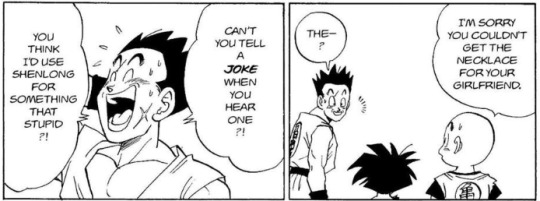
This is, surprisingly, a point of contention in the fandom as some of Yamcha's fans prefer the idea that he died miserable and alone after Bulma ruined his life by leaving him. This takeback gets pointed to as proof that he made up his girlfriend entirely. However, in context, it's clear that a) he's trying to brush off his earlier attempt at making a petty wish and b) the thing he's transparently pretending was a joke is the necklace wish, not the existence of his new girlfriend.
Like Bulma, Yamcha moved on with his life after the break up of their miserable relationship. And that was the final word that was ever uttered on Yamcha's romantic prospects, because this was the last time he was ever meaningfully involved with anything at all.
100 notes
·
View notes
Text
People keep claiming Chinese BL manhua really only have stories featuring toxic male leads, so I offered to give recommendations with green flags... Someone finally said yes, so here's what I typed up in response!:
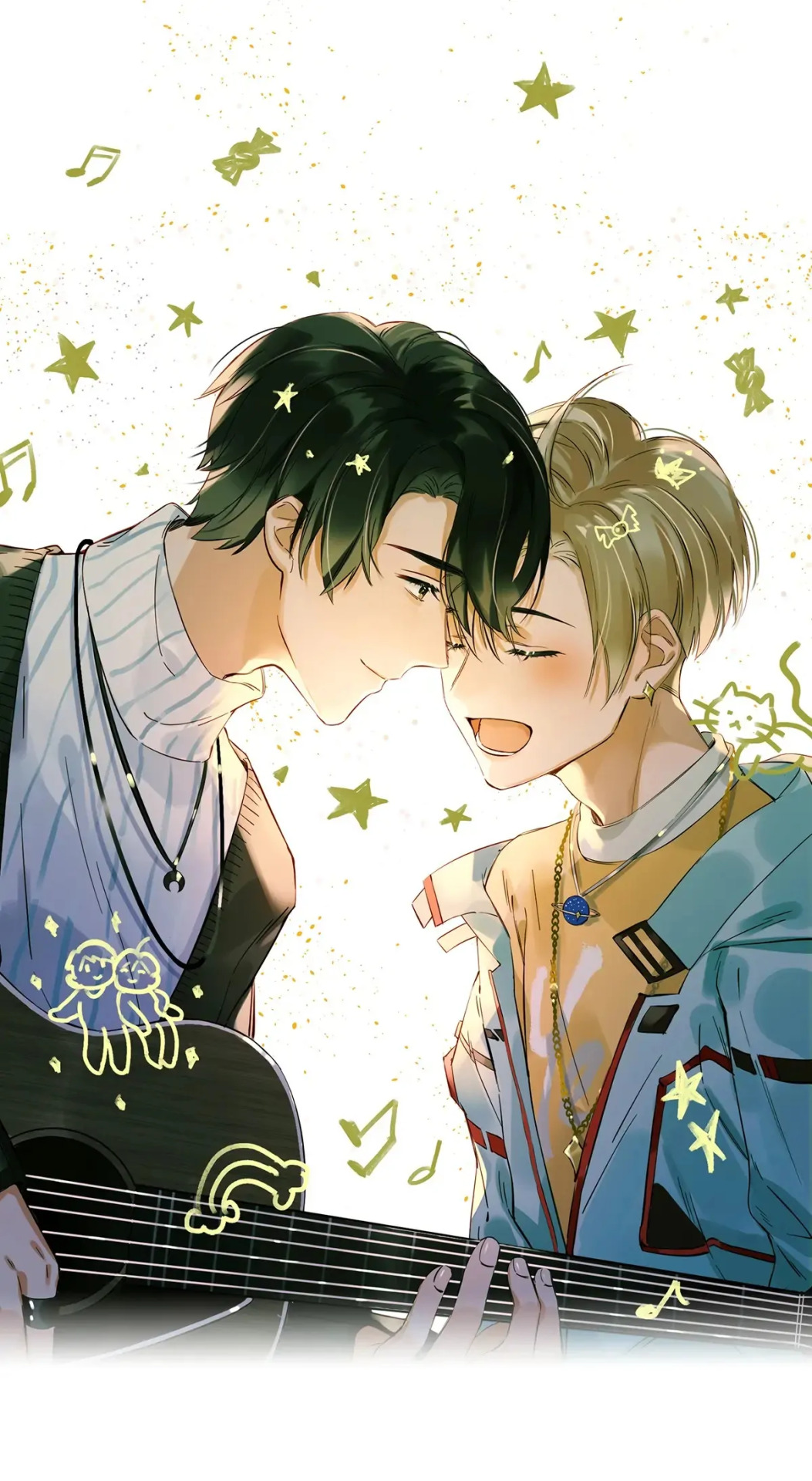
I Ship My Rival x Me:
One of my personal favourites!
Based on the hilarious novel, commonly known as I Ship My Adversary x Me and also has an audio drama adaptation on MaoEr FM. Basically a story about two actors who are seen as complete rivals by everyone except the actors themselves, which annoys the main character (Wei Yanzi) enough that when he discovers there are actual fans who ship them instead of pit them against one another, he’s so excited he sort of starts shipping them too (in like, an abstract, theoretical manner lmao). This of course causes shenanigans as he actually gets to know the person who people ship him with/pit him against, Gu Yiliang.
Gu Yiliang is a true sweetheart and the greenest of green flags. He’s a complete puppy and I love him. And this means, naturally, the only misunderstandings in this story are of the hilarious kind (you’ll know what I mean if you read it lol). 😂
This one actually used to be available officially in English on the Bilibili manhua’s international app before it got shut down, but it recently got picked up by Seven Seas, the company behind a lot of official English translations of danmei (Chinese BL)!
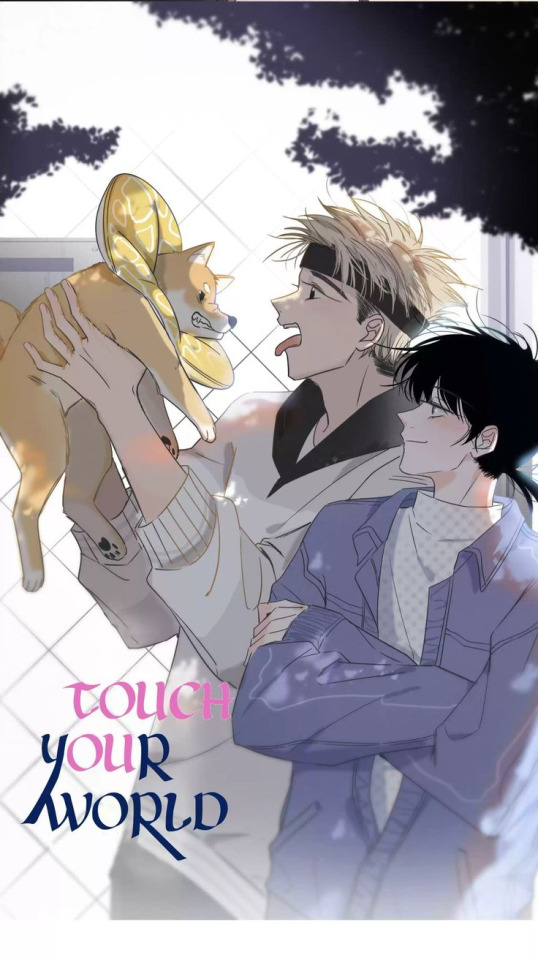
Touch Your World:
A literally colour-blind boy (as in, he cannot see colour at all and only sees things in black and white) discovers someone who he can see colour on. This person is a designer who has suffered past betrayal and trauma that has caused him to shut himself up and grow much more on edge, but this chance meeting draws both parties out of their shells.
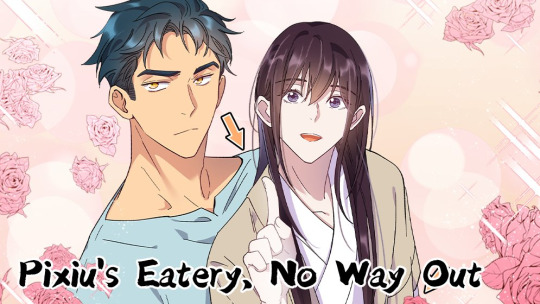
Pixiu’s Eatery, No Way Out:
Not a green flag top in the traditional sense, but here we meet the mythical Pixiu: an ancient Chinese mythical creature who now runs a restaurant. While he’s a penny-pincher with a temper and he doesn’t get along with his love interest at first (a ghost named Wen Xi who he finds suspicious due to Wen Xi’s ties to a past rival of his named Taotie), Pixiu and Wen Xi eventually grow, quite naturally—and hilariously!—into a found family.
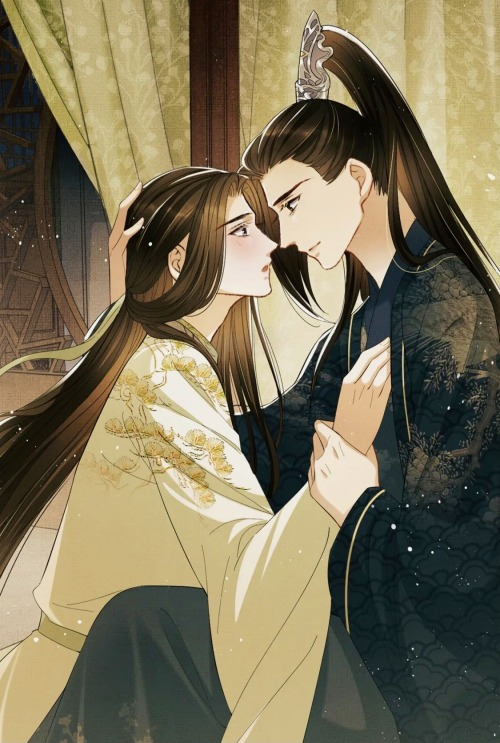
The Wife Is First:
Based on a novel of pretty much the same name (and is written by the same author as the popular manhua and donghua, No Doubt in Us (a heterosexual body-swap romance, which also has a subtle gay side ship)). Here we meet Jing Shao just as he’s about to lose everything: once a royal and a powerful general, he has been betrayed by all those around him…except the husband he has never treated well.
As such, when we first meet him, we actually witness his—and his husband’s—deaths. But then he awakens and finds himself back in time to the night right after he was forced to wed this husband of his, and Jing Shao vows to treat him well from now on because he stuck with him through thick and thin despite everything.
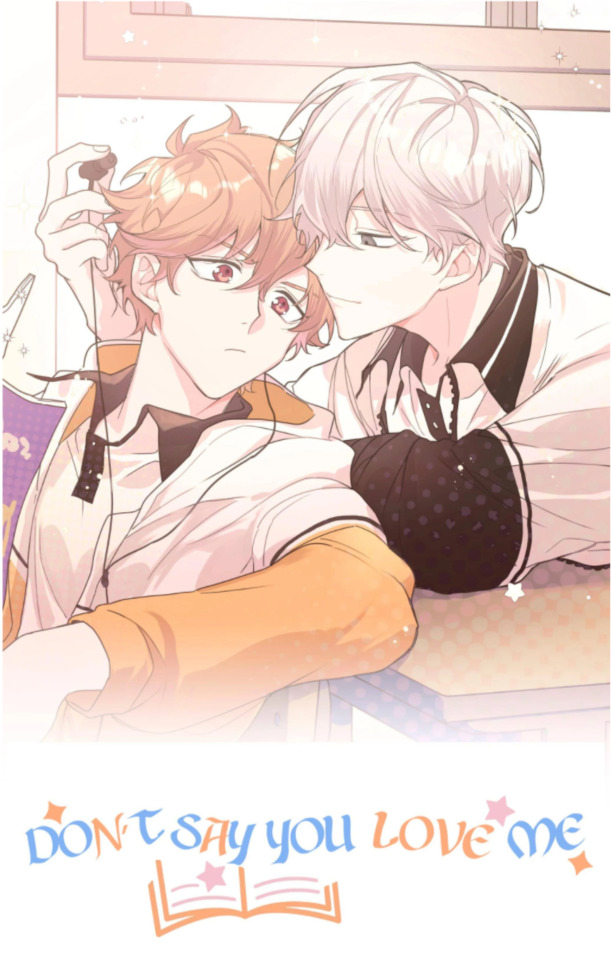
Don’t Say You Love Me:
A high school romance with a supernatural twist: Lin Yutong was confessed to by his best friend, Qin Weiyun, at their graduation party. When he drunkenly freaked out and ran away, Qin Weiyun was hit by a car during the chase…
Devastated by his loss, Lin Yutong quickly wakes up to find himself back at the start of his high school journey, right before he meets Qin Weiyun… And this time, he wants to keep Qin Weiyun safe.
But his overly familiar attitude at first gets the wary Qin Weiyun a tad suspicious, because he’s actually quite an aloof person.
The author and artist of this one is also behind another popular manhua titled Your Dream Is Delicious, which is about a demon named Yi Kui who discovers he enjoys eating the nightmares of Lin You. This eventually leads to them—you guessed it—falling in love.
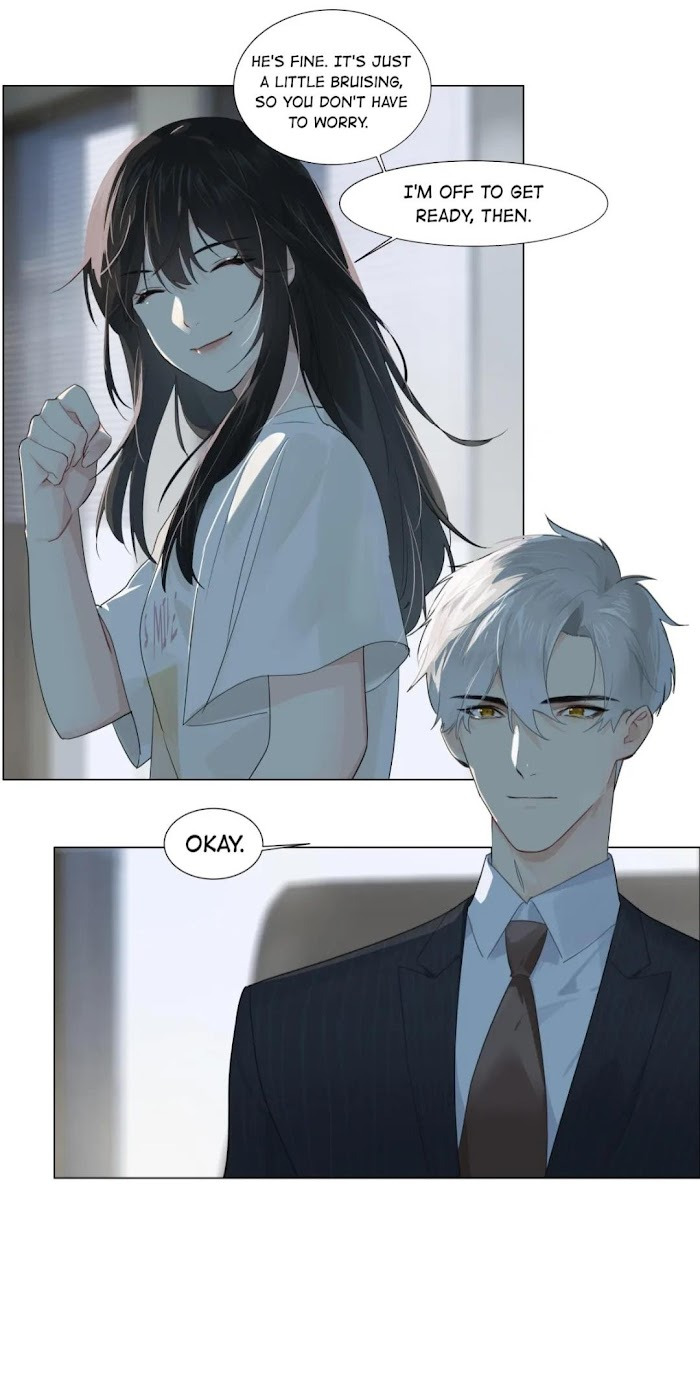
It’s Not That I Want to Wear Women’s Clothing:
Our main character is hired to crossdress to help this CEO get over his gynophobia (fear of touching women) without him knowing. Naturally, this leads to an awkward romantic journey of both identities of our main character getting close to this CEO…who at first glance seems like the typical cold and aloof CEO type, except he’s actually quite a sweetheart.
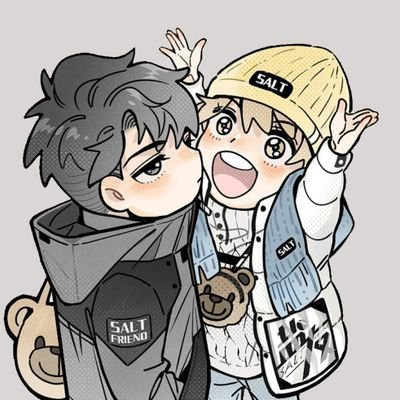
Salt Friend:
A slice-of-life high school story about the “school bully” named Tong Yang who’s actually a crybaby and the aloof person named Xiao Zhen who discovers him crying. While the two don’t seem like they’d get along at first glance, this quickly becomes a friends-to-lovers story that navigates family drama alongside the romance.
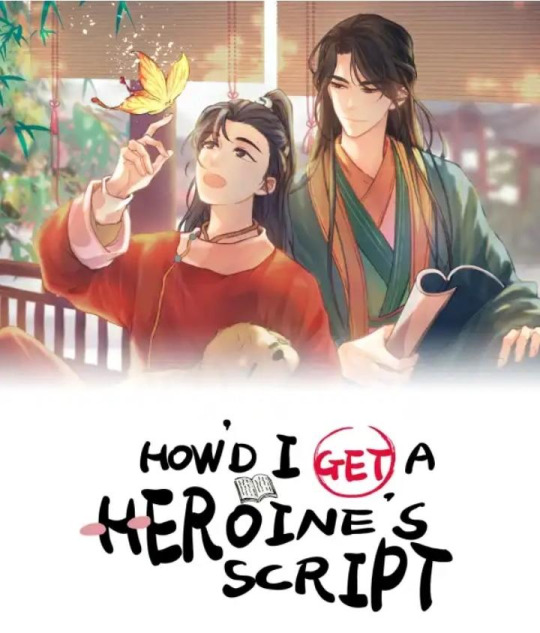
How’d I Get a Heroine’s Script?:
A transmigration story with a twist. Chao Yi is wheelchair-bound but finds himself eventually as a young lord in what is basically a palace drama (court politics, intrigue, family drama, all that good stuff). His System, Qin Que, tasks him with wooing the difficult 7th prince, Gu Yunheng, who smiles on the surface but is quite cold in actuality.
Despite the two getting off on the wrong foot—mostly because Gu Yunheng is really hard to get close to—they soon end up as unlikely allies…especially since there’s a lot of secrets, such as regarding the death of the body Chao Yi’s occupying, the scheming princes, and even Gu Yunheng himself.

See You My King:
Zhang Li, a student interested in what is basically ancient Egypt, goes on an expedition to the ruined civilization and nearly loses his life. Except at the same time, he discovers an ancient tomb with a statue that actually comes to life and saves him…
And this statue even follows him home. This statue is sweet and loving despite its inability to speak, and Zhang Li grows attached to it (or him)… But then the statue falls apart and Zhang Li is devastated.
In wishing for a miracle to bring them back together, the statue’s stone heart sends Zhang Li back in time…to when this ancient civilization is still present. And that’s how he discovers his stone statue is the “tyrant king” of this region, and as cruel as he seems at first glance, both this king and Zhang Li eventually grow close and unfold the different sides to one another that makes them inseparable in the face of all kinds of threats.
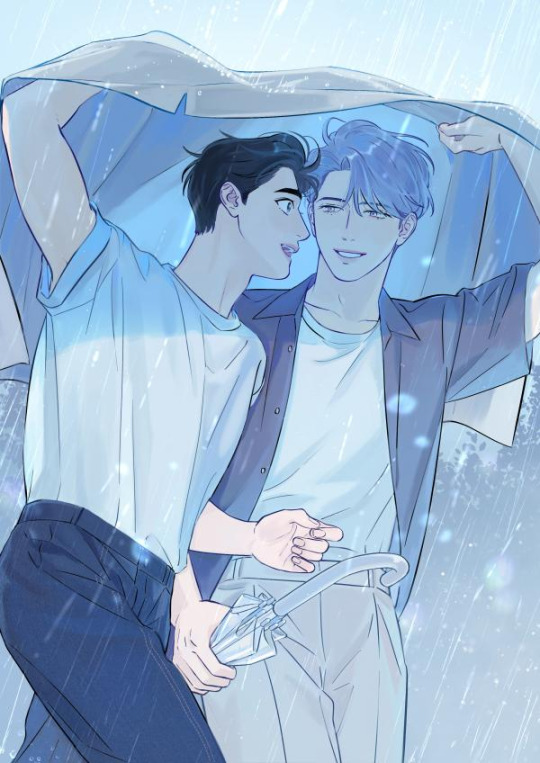
Trapping the Foxy Doctor:
A doctor and a psychiatrist meet…except it doesn’t seem like a perfect love story at first glance. Not because the doctor is traditionally foxy (seductive and/or cunning), but because he’s so silly and on-the-nose that he initially kind of rubs the psychiatrist the wrong way. Except, of course, with the kind of sunny sincerity displayed by our doctor Zhi Banyi, you can’t resist him for long…
And the psychiatrist, Lin Li, is himself quite a polite soul despite his complex upbringing. As such, the two end up together through a series of cases where they have to collaborate and help clients, with a lot of shenanigans sprinkled in between (including the fact Lin Li has a side-job live-streaming as a woman—and “she” just so happens to be Zhi Banyi’s favourite streamer lol).

Pirouette Into My Heart aka Salad Days:
You know the “he was a skater boy and she did ballet” kind of set-up? Well here we have a boxer and a ballet dancer…and hey, “can I make it any more obvious”?
This one is basically a feel-good story of the century. It’s childhood friends to lovers, and it’s soft and cuddly and encouraging, as we follow the main character, Jiang Shen, in achieving his ballet dreams. And on every step of the way, he’s accompanied by the boxer Bai Jinyi, who’s also chasing his own dreams.
The draw of this one is that while there’s obviously conflict to drive the plot along, it’s ultimately a comforting story, so you get all warm and squishy inside reading it. Bai Jinyi and Jiang Shen are very supportive of one another, as is everyone around them.
There’s even extras at the very end that swap the classes of the two main characters, which makes for a similarly compelling AU. 🤭
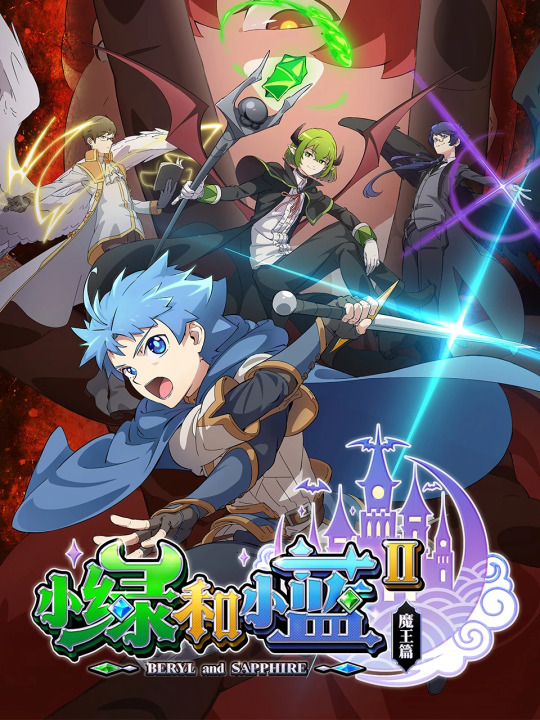
Beryl and Sapphire:
Not always BL but often is. What do I mean by that? Well it’s a story that can switch to any universe even as the characters stay the same, and some worlds are just one-off gags while some are whole story arcs. The original manhua features stick figures, so if you really want to experience this one, I’d recommend the donghua. The first season also cleverly shows the main characters as actors in the OP, which explains all the world-switching pretty easily haha.

Don’t Pick Up Boyfriends from the Trash Bin:
Unfortunately I’m not sure the manhua for this one is still ongoing, but the original novel (all about transmigration and hopping multiple worlds) 100% features a green flag top.

The Guy Inside Me:
I know the title sounds sexual lol but it’s actually a joke about how it’s a body-swap story. 😆
The original Chinese title is “This Question Is Too Difficult”) and of course, the author also wrote Fake Slackers, which has two very smart students act like terrible ones due to not wanting trouble.
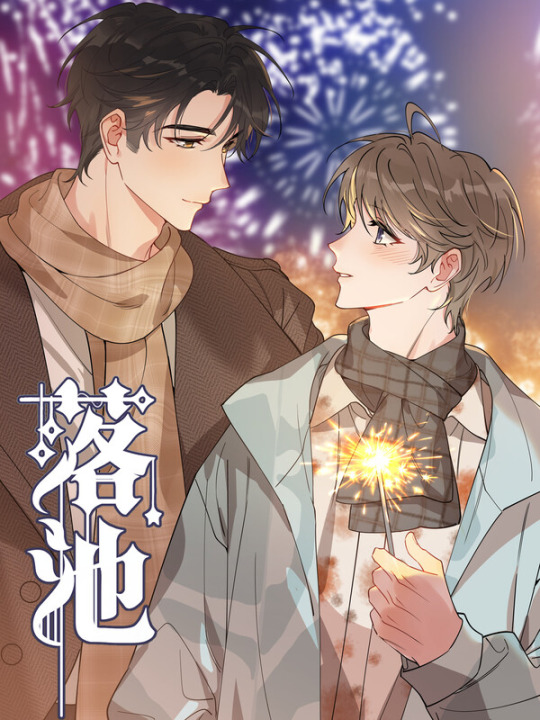
Falling to Where I Belong:
The thing about this one is that the top is 100% a total green flag... It's the main character that's more of a red flag, in the sense he at first only asks the top out to humiliate him due to a misunderstanding.
But it's still a heartfelt story filled with regret and growth, and I did really like the portrayal of Cheng Feichi. Personally I think the manhua humanizes him a bit more than the novel since we didn't really get his POV in the novel that often, but I did hope for even more emotion in the ending... Still, it was a satisfying read, and while I would like to comfort the main character, Zhen Yeming, over his regrets, I really want to just give all the good things to Cheng Feichi, who definitely deserves it after everything he went through.
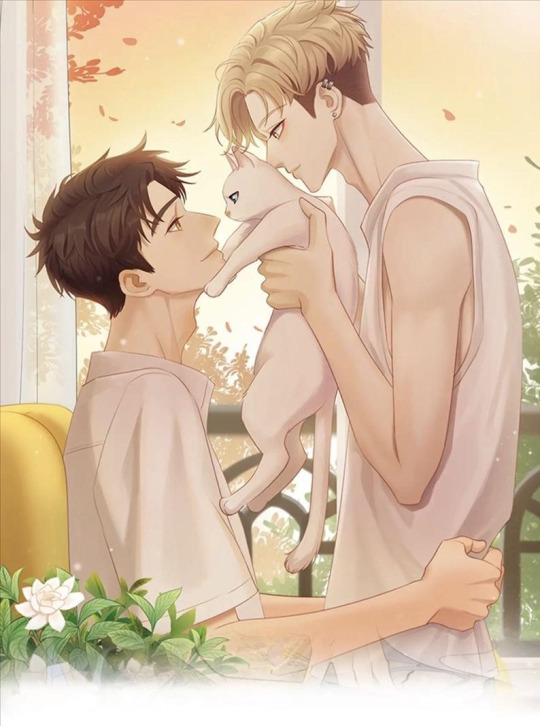
More Than Brothers:
For the "non-freaks" out there, they're not actual brothers, don’t worry; not adopted brothers either. Just a guy who saw his younger friend as his bro…until this friend disappeared from his life and apparently got into a bad crowd… Except in reality he is being harassed and is struggling to leave his abusive family.

The Protagonist Just Wants to Fall in Love:
Kind of a classic in the transmigration genre, except now we get multiple worlds in multiple arcs. Our protagonists are Systems on their final mission, aiming to become human by the end of it, and their task is to guide their protagonists away from the path of "darkening" (essentially corruption).
And each and every one of these systems do so by getting their protagonist to fall in love with them lol.
Unsurprisingly, my favourite arc so far—in the manhua at least!—is the historical one between the advisor and the emperor, but the third—and currently ongoing as the time of me writing this—world between two university students who started getting close during military training and by playing games is also quite cute.
And okay, man I could really keep going, especially with the manhua that are based on novels, but this post is already really long asjakfl. It was, in fact, so fucking long YouTube wouldn't even let me post it at first until I cut it down AMFKGSJDFGS.
But I still want to at least give a shout out to some of the manhua with pretty healthy, green flag tops/gongs!:
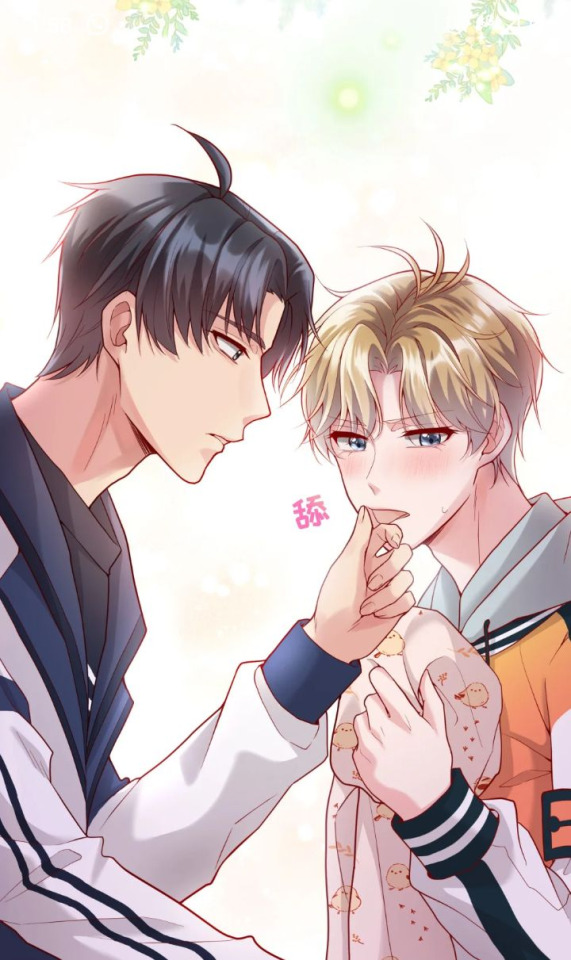
Like Han Yuan, despite the characters not getting along at first and Yu Han being rather aloof to the spoiled Luo Linyuan, is still quite sweet at its core. Lovely Allergen is as well, even with their "brotherly" relationship being the forefront of the conflict between Song Yu and Yue Zishi.
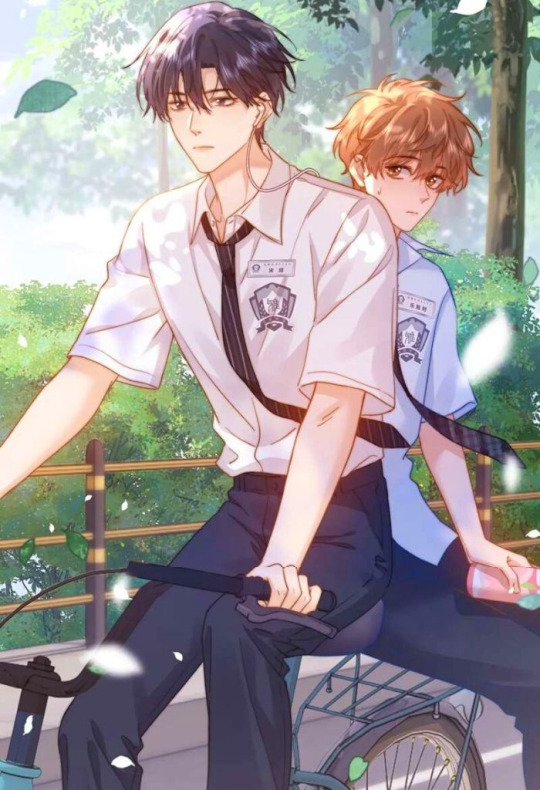
Another kind I wanted to bring up is the ones where their worlds or stories are dark, but the characters aren't necessarily. Like The Film Emperor, He Insisted on Being My Patron has a very green flag gong (he's such a puppy!), but he and the main character are up against the reddest of red flags of a villain LMDFKGSJFD.
It's also not a manhua I think people who want green flag leads would necessarily enjoy, given that beyond being "darker," it also goes into the territory of fan service-y and "problematic" nsfw content, but again, the male lead is really quite sweet to the main character despite the shitty situation they're in.

And I thought of Bu Chonghua from Tunhai aka Swallowing the Seas (another one based on a novel), since the main character there, Wu Yu, comes to see Bu Chonghua as so good and just that he pushes him away because he feels like he can't dirty such a man with his own darkness, both in his past and personality. It's a trope I really enjoy.
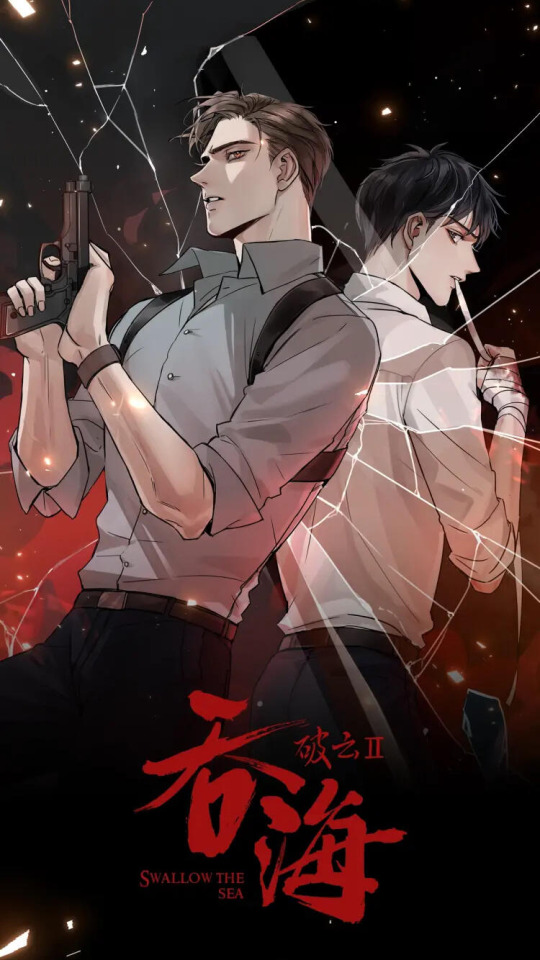
I'll briefly mention some ⚠️ spoilers ⚠️but the reason I wanted to highlight it is because: the latest chapter of the manhua has Bu Chonghua overhear Wu Yu saying he likes Bu Chonghua, and this is after Wu Yu disappeared and Bu Chonghua is worried he skipped town for good. He follows Wu Yu, all while wondering if the like Wu Yu holds for him is the same as his liking of Wu Yu, and when Wu Yu is about to be gravely injured in an underground fighting ring, Bu Chonghua steps in to save him... The chapter ends with Wu Yu holding him back pleading with him to stop because it's not worth dirtying his hands with such a man as his opponent, and that's such a delicious flavour of angst because like...Wu Yu thinks it's fine for he himself to fight against such a person, but he doesn't want Bu Chonghua to. ;-;
Oops. I didn't mean for this to become a deeper ramble of Tunhai KMSGFKGHSJ. It's just interesting to me since Tunhai and its prequel, Poyun aka Breaking Through the Clouds, may not have what the people who prefer green flag tops want in terms of content, but its tops are technically not that much of a red flag either.
Which also get us to the kind of stories where plot can also sort of outweigh whether a top/gong is a green flag or not. Like No Arguing With Mr. Mo has two characters who struggle greatly in their relationship, with the question of "are they in love?" being an overarching issue for them, meaning it's not exactly healthy, and prevents them from being fully either green or red flags.
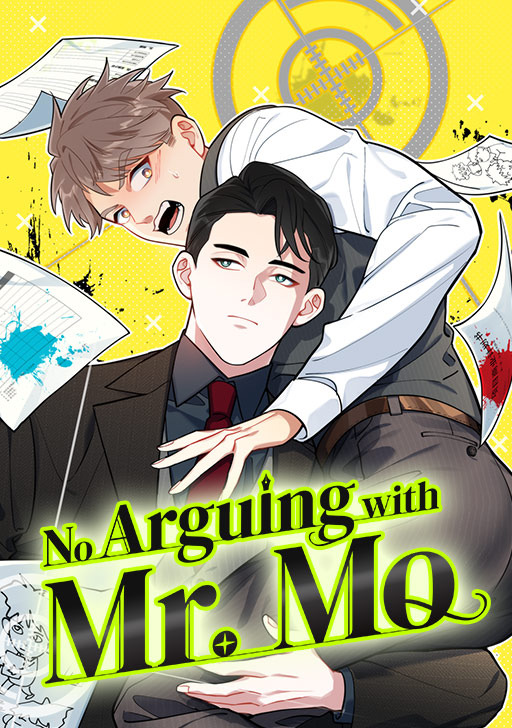
I also didn't bring up a lot of historical/xianxia manhua, which I'm sure some people may disagree with... Like the leads in Tianbao Fuyao Lu are arguably quite good, and while I haven't read Dinghai Fusheng Lu yet, I assume it's in a similar boat as something set in the same world.
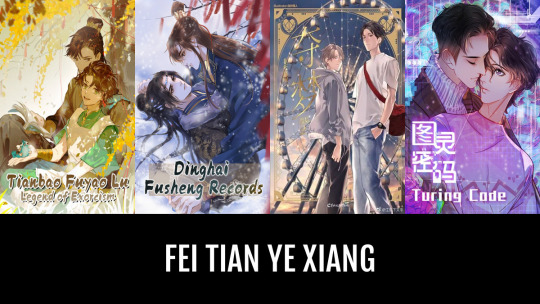
And then there's the ones that develop into green flags... Like Mo Ran starts off awful, yes, but he does become much better later on!! But I don't think that's what those people after green flags want to hear lol. Plus I'd argue Erha is best experienced in novel (or audio drama) form over the manhua anyway—the manhua feels more like something made for established fans in my opinion.
Regardless, I hope this shows that with so many listed above, many manhua actually feature male leads who really do care for their love interests in a healthy, respectful way, whether they're 100% green flags or they develop into green flags or they're not even complete green flags. ^^
Edit: Oh I forgot to link my full list of danmei/baihe manhua recs HMSKFJSKS. I currently don’t have any summaries, tags, or content warnings in this list though, but there’s quite the range of stories!:
#manhua#danmei#kuku88#kuku rambles#I ship my adversary x me#I ship my rival x me#pixiu's eatery no way out#the wife is first#you own my all#tunhai#swallowing the seas#breaking through the clouds#poyun#see you my king#beryl and sapphire#it's not that i want to wear women's clothing#how'd I get a heroine's script#pirouette into my heart#salad days#salt friend#trapping the foxy doctor#don't say you love me#falling to where I belong#falling into the pond#the guy inside me#don't pick up boyfriends from the trash bin#the protagonist just wants to fall in love#more than brothers#touch your world#long post
57 notes
·
View notes
Text
[...] Women did have (and were expected to have) an interest in chivalry that could lead them in their reading to identify with knights rather than with ladies or to imagine the ladies as active in defense of their own interests. The tendency of romance to focus on battles between men and to present women as needing men’s help is a stylization of gender relations. While Armstrong is right that the Round Table oath does imagine women as vulnerable, that is not the only way available to medieval authors to represent women, and Malory has a number of female characters who have more complex and active chivalric roles. Active women were not automatically bad; assertive women were not automatically subversive.
Malory does of course include bad women within his text, but he includes good ones as well; and not to include bad women would have been either to dismiss women as so powerless as to lack the ability to do significant harm or as so idealized that they cease to be human. Lyones, Nyneve, both Elaines, Percivale’s sister, and others all come across as sympathetic women acting on their own interests.To dismiss some of these women as patriarchal tools because their actions advance the interests of men is unfair, for a woman that desires to be altruistic or political in the Morte Darthur would almost of necessity have to work with men. Likewise, to attribute to “patriarchal gynophobia” any woman’s act that contributes to the final collapse of Arthur’s realm seems overly simplistic; while women (Guinevere, Morgause) contribute to the final fall of the Round Table, so do men (Mordred, Gawain, Launcelot, Arthur).While Malory is not a modern feminist, neither is he a stereotypical medieval misogynist.
– Kenneth Hodges, Forging Chivalric Communities in Malory's Le Morte Darthur
20 notes
·
View notes
Text
Zakari's Thoughts on Second Members

Jiro Yamada
"Jiro is one of my close friends! He and I met a few years back when he was in the orphanage and in middle school. Kind of ironic that we're both in high school together despite being five years apart. When we aren't doing schoolwork together, I like to play games of chance with him. I think he likes seeing me perform dangerous stunts cause he's always afraid I'll chicken out. Joke's on him, though. There's pretty much nothing I won't do if it gets me a rush!"
Jyuto Iruma
"Urgh, my parents have the right idea with this guy. Can you believe he once tried to give me a ticket for performing parkour in my own neighborhood? He claimed I was "disturbing the peace" or some shit, like that. Buddy, pretty much everyone in Roppongi and Minato knows I do this shit in my spare time. In fact, they pretty much love seeing me hop to and fro. So saying I'm "disturbing the peace" is just a sad excuse to want to give someone a fine. Nice try, though."
Gentaro Yumeno
"I'm not as close to Gentaro as I am to Dice, but he's still a pretty cool guy... with a unique fashion sense. I know people get on him for his constant lying, but considering he's a writer, it's no surprise everything he says may or may not be the truth. He and I actually have a little side bet going on. If I can catch him in one of his lies before the month is over, then he has to feature me as a character in one of his next stories! But if I don't, I have to pay for the editing and publishing of his next book. I'm really looking forward to it!"
Hifumi Izanami
"Far be it for me to judge someone's phobias, but I really don't get Hifumi's. When he has his jacket on, he's a flirtatious playboy. But when he takes off, he develops a very bad case of gynophobia? Maybe he should consider seeing a psychiatrist. ...A 'male' one."
Rosho Tsutsujimori
"Rosho-sensei... I've heard about his fear of speaking in front of large crowds. Kind of a shocker considering he used to be a comedian along with Sasara-san. A shame he broke up a good thing, though. And jumping from comedy to teaching? Talk about a leap. Still, the guy does teach fairly well when he manages to work up the nerve. I'm glad I only have online classes with him, though."
Jyushi Aimono
"I know Jyushi mainly because of Kuko, but his band, ArgoξOrchestra, isn't bad either. He sounds a lot different on stage than he does usually, but considering he's a musician, that's kind of a given. I noticed he carries around a stuffed pig with him. He calls it 'Amanda'. Apparently, it was a gift from his grandmother, so he carries it as some sort of security blanket. Not that I'm judging, of course. We all need something to help us face this huge and dangerous world. Me, all I need is my parents and my luck!"
#hypmic#hypmic oc#hypnosis mic#hypnosis mic oc#hypnosis microphone#zakari hiroya#private party#roppongi division#jiro yamada#jyuto iruma#gentaro yumeno#hifumi izanami#rosho tsutsujimori#jyushi aimono
9 notes
·
View notes
Text
An Analysis of Ryu’s Route in “NO, THANK YOU!!!”
I originally posted this to Twitter as a thread, but I’m going to post it as a whole analysis here.

For a lot of NTY!!! players, Ryu is a difficult character to understand. "Does he even feel anything for Haru?" many people ask. "There is no chemistry!"
There is actually a lot of it! Ryu feels quite a lot for Haru, too, but because of the nature of his character, his love is shown implicitly through careful actions in his route. For those who are confused, I’ve got an analysis that breaks down Ryu’s backstory and personality, his route themes, and his significance to Haru’s overall character and the game as a whole.
Warning: If you haven’t played Ryu’s route, this contains spoilers. The analysis also has references to CSA.
I. Backstory and Personality
There are a number of very important aspects to consider when understanding Ryu. The main one is that this man has Extreme Trust Issues(TM) and is this damn close to imploding from all of the misfortune in his life.
According to the sourcebook and implied in his POV flashback in-game, at the age of 13, Ryu was groomed and manipulated by his older female cousin, and he witnessed his uncle perving on his little sister, who was only 8 at that time. His trust in the world was shattered and his personality subsequently suffered. He developed an obsession with cleanliness and a mild form of gynophobia.
After he moved out with his sister at 15, Ryu then had to experience losing Ai at 21. He went to the police and they didn't even file a missing persons report. Who the hell can this man trust? Nobody, he's learned. He’s lost all his loved ones and he’s alone under the world’s foot. Ryu's been through so much hurt, it's no wonder he's a bit of an asshole.
His entire life was dedicated to protecting his sister, and she was his reason for living. Hell, Ai is his reason for living. The only reason he works under Kouichi in the first place is to figure out where she is.
The sad thing is, Ryu only trusts Kouichi to a degree. He believes that the world operates on “fuck yours, got mine” philosophy.
That is more than a decade’s worth of trauma for him. To survive in an awful world like this, Ryu has to put up walls around his heart and won’t let anyone in his world.
But that's not all there is to him. When Haru says, "Ryu might even be kinder than Hiroshi," he's right. Deep down, Ryu is a very compassionate individual who does everything he can to help those who are vulnerable, especially children and CSA victims. While he won't jump in head-first without knowing the full story, he'll always find a way to do something.
Case in point: the Igarashi siblings' case. Ryu, as a CSA victim himself, is quick to correct Kouichi and say it's "sexual abuse" and not "Sorato having a relationship with his mother," and is the only love interest to actually help Rikuto and Sorato successfully.
While I'll be mentioning Yufumi later, you can especially see Ryu's soft side with Hiroyuki and Ren. Both men are still green around the gills and wear their hearts on their sleeves, but Hiroyuki is naive while Ren is incredibly jaded from his own sexual and physical trauma (mentioned in the sourcebook). Ryu has gone as far as to house Hiroyuki back when the guy was 19 and teach him everything from cooking and house upkeep, and will always make sure Hiroyuki's okay at work. He is just as nurturing with Ren, who idolizes him for his competence and coldness.
Hiroyuki, who sees the good in others, views Ryu as a strict but kind man who's much like a mom. Ren, who distrusts everyone, sees Ryu's ruthlessness and cunning intelligence. Ryu's route showcases both of their viewpoints, but whose interpretation of Ryu is right?
As it turns out, neither of them are correct. Haru is the only person who sees Ryu for who he is: incredibly stubborn, reactive, petty, thoughtful, sweet and in a lot of pain. He learns this by doing what no one's ever dared to do: worm his way into Ryu's heart.
If you compare everyone's routes, you'll notice that Haru treats Ryu differently compared to how he treats Hiroyuki, Maki and Kouichi. Haru is much gentler in Ryu's route, (almost) always asks for his vocal consent, never uses his killer face on him, and always has him in mind during their interactions.
Now, Ryu's been suspicious of Haru since the very beginning, and it doesn't help that he hates stupid people. However, Haru's heart is undeniably in the right place, and Ryu is not blind. As the route progresses, he begins to care for Haru and eventually falls in love with him.
“But wait!” you might say. “How do you know he even loves Haru?”
And to that, I say, “Look closely!”
There are three main themes that are present in Ryu's route that showcase how Ryu's feelings change toward Haru from dislike to love:
a place to call home;
freedom;
the dichotomy of love and trust.
I will be splitting the next section into these three themes Haru and Ryu connect emotionally on.
IIA. A Place to Call Home, and a Child of Love
From the day he was born, the "amnesiac" who came to sótano was simply a broken toy of his father's, and has nothing to his name. No family, no home, nothing. He doesn't even have a name... until Ryu gives him one: "Haru."
By the time Chapter 3 rolls around, Haru has sótano as his newfound family, but he finds another one in Ryu's apartment. That is where he eats the Japanese home-cooked meals he's always wished to eat (via sourcebook), does the chores he's always wanted to do, and gets a slice of a normal life.
Ryu knows what a happy home looks like. Although he mentions that his mother "wasn't perfect," she was kind. Both his mother and father, according to the setting sourcebook, were very much in love and raised both Ryu and Ai with utmost love and care.
He no longer has this. Now, he's content with being alone because he can no longer trust anyone, but, while watching Haru react with joy over doing ordinary things like washing dishes, cutting burdock root and eating his food, Ryu gains a bit of insight into what Haru grew up without.
Enter Yufumi, the neglected and abused child who lives next door to Haru. She, too, does not truly have a place to call home because her mother views her as a burden. She's never had a home-cooked meal from a mother, been praised, or given any clothes.
Furthermore, Eyebrows, too, never had a home. He was a stray kitten who was about to become crow food had Haru not saved him. Two people (and one cat) who have never known what a stable, loving home felt like. And they all found home with Ryu.
So they form a somewhat patchwork family of a husband (Haru), a wife (Ryu, according to Haru's own words), and two children (Yufumi and Eyebrows). But what does is the significance of this to Ryu?
I'd like to take your attention to the matsuri scene for this one. Prior to them going to the festival, Ryu watches Haru and Yufumi tinker around on the piano. The soft gaze Haru catches from him makes it clear Ryu is thinking back to the days when it was just him and his sister, Ai.
However, the matsuri scene also shows something else.
Recall Ryu's POV prior to the Bad End/Good End branch. Ryu was taken to a jazz restaurant by his parents and fell in love with the piano there at the age of 5. The sourcebook elaborates on this and explains that his parents did it on their anniversary date. Ryu, as a child, hand-in-hand inside the restaurant with his parents, and immediately being taken in by the sights and sounds. Does this sound familiar?
This is a parallel to the matsuri scene with Haru, Ryu and Yufumi. It's six-year-old Yufumi's first time seeing fireworks, and she gets to see them on a “date” between Haru and Ryu, who first met in a jazz bar. She is not only symbolic of Ryu’s happy childhood with his parents, but also of the foundation of love and care Haru and Ryu build together. Yufumi grows out of her shell and comfortably voices what she wants, and is visibly excited and happy under their parenting. In other words, the route pushes her solidly as their love child.
Now, when Ryu gently scolds Haru about being more excited than the children, Haru tells him to enjoy himself while he's here. The matsuri scene is also important because that is when Haru starts to plant the seed of doubt in Ryu's head and really, really tries to convince him to adopt Yufumi for both of their sakes. He knows how lonely Ryu is and how safe Yufumi would be with him, so why not raise her?
And what does Ryu do by the end of the route, thanks to Haru? Adopts Yufumi and Eyebrows because the cat is also a part of the family. I should point out that, without Haru’s influence, Ryu doesn't adopt Yufumi or Eyebrows, and the latter two are separated in other routes.
The thing is... in the epilogue, it's revealed that Ryu extends that offer of being a family to Haru, too, in the form of keeping the last coupon. That coupon represents the promise to bind them together, the one that will make Haru come home to him in the future because he never breaks his promises. The reason Ryu is willing to do that for Haru, of all people, is because Haru did what no one else could: set him free and show him unconditional love in spite of everything.
IIB. Freedom
Freedom is a major theme of Ryu's route and character, and it's one of the aspects that fosters the romance between him and Haru as well. Ryu, by nature, is tightly wound and controlled in every way you can think of: physically, sexually, emotionally, verbally, etc.
Ryu does not enjoy life because he's shackled himself to his goals. He takes things for granted because nothing in the world is worth more to him than his sister. He does not know what he has until he loses it, and it takes Haru's presence in his life for him to understand that. Haru saving Ryu and freeing him from his shackles is represented by foreshadowing in a physical example: Haru unlocking Ryu's zip-ties in the garage scene in Chapter 2.
"What are we going to do?"
"Beats me."
"Um... I have a proposal."
This humorous scene actually mirrors the reveal in the final chapter, after Ryu finally sees what happened to his sister.
Ryu, who's broken down and cries in anguish, does not know what to do and begs Haru to kill everyone. He's at his weakest and he has no way out. It's clear he's given up on life and wants the world to burn, knowing that his sister is in that state and would be better off dead.
Haru refuses. With gentle but honest coaxing, he shows Ryu that there is a way out of the darkness and that he still has something to live for: Yufumi. He gives Ryu a reason to stay alive and start all over again, and to stop clinging to the past that will never return. With that, Haru frees Ryu from 17 years' worth of self-sacrifice. He's free to play piano as much as he want again. He can take care of Yufumi like he's always wanted to. Ryu can't get any of the time he lost back... but Haru gives him a miracle.
(This is a direct nod to the conversation Ryu has with Ren, too, about how lost time cannot be brought back in any way.)
To Ryu, who's been single-mindedly pursuing the impossible, this is essentially giving him a second chance at life. It's not only Ryu who's given freedom, either. Yufumi, as well, is given a second chance at life when Haru gives her a similar talk about whether or not she wants to wait for her mom or move on. Thanks to him, Yufumi lets go and is able to move on, just like Ryu, and is able to walk toward goals she wants the most. The fact that Haru is able to do that for them solidifies Ryu's love for him, and that is why he holds onto that last coupon. Because Haru never breaks his promises, he's certain he'll come home. In true tsundere fashion, Ryu frames it as, "I'll allow you to come back to me."
"But Somni!” you interject. “Are you sure Ryu loves Haru? What if he just respects him?"
There are certain things Ryu does for Haru that he does for absolutely no one else, not even his own flesh and blood. Remember that he has his heart encased in an icy prison and lets no one see who he really is. Not only is Haru the only person who gets to see Ryu's foul temper and lack of composure, he's also the only one who gets to see Ryu's playful side.
There are various times throughout the route in which Ryu pranks and toys with Haru, but the cutest one involves the dustcloth. The dustcloth represents Ryu's affection, much like one would see from a noblewoman when she gives it to a knight vying for her hand. Ryu could have simply made the phone holder and be done with it, but he went the extra mile to make a gag gift. And that was done to poke fun at Haru and have him go from excited to dismayed. Unfortunately, Haru is dense as hell, so the prank flies over his head and Ryu has to give him his real gift.
Make no mistake, though—the important thing is not the phone case, but the dustcloth, the proof of Ryu’s affection.
The thing is, Haru also receives the phone case in the Ballad of a Killer ending, but he does not receive the dustcloth. The major difference in this branch is whether or not Haru proves that Ryu was right to fall in love with him.
IIC. The Dichotomy of Love and Trust
Love and trust are not mutually inclusive in Ryu's route. There is a huge difference between loving someone and trusting them, and while his own feelings can’t be controlled, earning Ryu's trust is how he allows himself to fall in love with Haru in the first place.
The key to Ryu's Good Ending is ensuring that Haru never, ever goes back on his word. Not getting handsy with Ryu in the shower shows Ryu that he was never serious about the coupons, so he has no reason to trust him. Refusing to go home when Ryu uses a coupon seals it completely and Haru has to pay for his betrayal with his life. You cannot toy with the feelings of a man with Extreme Trust Issues(TM) and expect to get away with it.
Ryu was already falling for Haru, showing concern when Haru put himself in danger and musing about the fun Haru must have had while laying out the yukata set he bought for Yufumi. He was beginning to trust Haru, too... until, in the Ballad End, the fucker broke his promise and did not obey the coupon. By doing that, Haru unintentionally reinforces Ryu's view of the world: trust no one. He was a fool for loving him in the first place. So Ryu ends up using Haru's feelings again him and tricks him into killing Mimasaka and being fatally injured in the process.
Even then, Ryu can't bring himself to shoot Haru. He still loves him even though Haru screams out the most vile things about his sister to enrage him and drop his guard. It's an incredibly heartbreaking ending because Ryu takes what he has for granted again and will never get that love back.
Here's the kicker: Ryu set that trap for Haru in advance. Whether or not he decides to utilize it depends entirely on Haru's choice to obey or disobey. In the Good Ending’s path, Haru realizes the Mimasaka thing was probably a trap and isn't even disappointed, and Ryu does not pursue it.
Slowly, Haru begins to earn more of Ryu's trust, even though there's a limit. The tipping point happens prior to their last H-scene together, when Ryu sees Haru napping and tucks him in, and lets him hear what his true feelings sound like through the piano.
In the OST, the song Ryu plays is titled "Passion," which shows how much fire and life he's keeping inside of him. This is something he doesn't allow anyone to listen to or touch because that can be easily taken away from him like everything else. He doesn’t even play this kind of jazz for patrons in the bar. The sourcebook notes that Ryu plays with all his might like this once or twice a month, when everyone else has gone home. However, he doesn't wake Haru or kick him out, but lets him sleep and listen. Haru understands the significance immediately and sees him for who he truly is.
Now, a lot of people would say their second-last H-scene is one that holds the most emotional value, but I'd actually argue that their last H-scene, the one after this piano scene, showcases all of Ryu's feelings for Haru out in the open. For this H-scene, I want to point to Lee's VA comments for Ryu. He mentions that Ryu's true feelings show themselves a little in this H-scene, which made recording for the route climax a lot easier. I also want to mention that Ryu's CSA experience is also vital here.
Ryu is a person who needs to be in control to feel safe because he can't trust anyone else to take the lead. The sourcebook reveals he doesn't even masturbate because, to him, that's a moral failing signifying a lack of control, which nods to his past.
The last H-scene he has with Haru is the first in which he has control over what happens (at least, for now). Haru pulls back at the lack of reciprocity, pouts, and whines about his feelings being hurt, which actually makes Ryu pause.
"If you want to have sex with me, make me want it."
Ryu does not want sex, ever. He's a traumatized, sex-negative asexual, has no interest in anyone, and would rather go through life without any of that dirty shit. Plus, we've learned from the second-last H-scene that sex acts without emotion actually bore Haru. Even so, Ryu wants to do it with him, who he loves and trusts. But how does he show it?
He gives Haru something he's never, ever given anyone in his life: his first kiss.
And not just any kiss—he practically eats Haru's face (although he absolutely sucks at it) and it makes Haru so happy, it gets him raring to go right away.
"But Somni,” you say. “It's just a kiss! It’s not that big of a deal!"
The thing is, this is coming from someone who won't even masturbate. Ryu shows major resistance when Haru asks him to touch himself. The kiss he gives him is something within his control but also comes from a place he allows no one to look. Ryu has never done this to anyone in his life because he's never felt anything this deeply before until Haru came along in his life. This kiss holds major, major significance in that he's showing how much he wants Haru and love him.
Allowing Ryu to initiate the first move during sex is cathartic. He gets to move things on his terms without being forced against his will, and, as the scene progresses, Ryu begins to want more of Haru and actively voices it. Major trust is required for that.
However, that's the limit for Ryu's because, above all else, he has one goal in mind: to find his sister. He's more than willing to aim a gun at Haru, the man he loves, to get what he wants. The power of compartmentalization is really something.
III. True Love
But then Haru fulfills his promise and shows him the truth. And then Ryu loses it. He crumbles. He's lost everything and is at his most vulnerable, with his broken heart out in the open. There's no point in anything anymore. But, when Ryu is at his weakest, Haru saves his heart. Haru protects him and sets him free with the coupons and the reminder that Yufumi is waiting for him. He was there when Ryu needed him most.
Everyone else in Ryu's life broke his trust and abandoned him, but Haru didn't. And that finally proves to Ryu that, yes, he trusts Haru and was right to fall in love with him and let him into his life. That is why Ryu, seeing the last coupon flutter before his eyes, holds onto it. He wants to see Haru again and have him come home to him.
I want to draw attention to the fact that the very last CG is Haru through Ryu's eyes. His gentle, happy smile is shown through both that and described through Ryu's inner dialogue. Haru never breaks his promises, and the coupon becomes a chain that binds them together forever.
Ryu's lost so much over the years. He lost his parents when he was 10. He lost his innocence at 13. He lost his sister at 21. He lost her all over again at 27. But he also got a family and his life back, thanks to Haru, and Ryu doesn't want to lose him, either. For so many years, Ryu's suffered alone in silence, and in just two months, Haru, that wonderful windstorm of a man, barged into his heart and changed him for the better. Ryu gave him everything he ever wanted, too.
While Ryu's love isn't traditionally flirty like Hiroyuki's, tension-charged as Maki's, or exciting like Kouichi's, it's romantic all the same, and it comes from deep down in the soul. Their love reflects the quiet, everyday love between two people who have been married for many years. He and Haru changed each other's lives for the better, and it's not just their lives, either.
Remember Yufumi and Eyebrows. Because of that love between Haru and Ryu, both Yufumi and Eyebrows have a home and will no longer be mistreated, hungry, filthy and neglected. Haru's and Ryu's love creates a nurturing environment that allows their children to grow and flourish.
Haru himself also gains the most in Ryu's route compared to the other routes. He gets not only an identity, but the milestones he believes he’ll never have are achieved, too: what it's like to be married (with Ryu), being a father (of Yufumi and Eyebrows), having his first home-cooked Japanese meal made with love, etc.. Ryu, so vibrant and full of life underneath that coldness, is a joy for Haru to unwrap over and over again, and how he manages to surprise him one last time by being willing to wait for him to come home solidifies Haru's love for him, too. Haru's so in love with Ryu physically, mentally, sexually and emotionally, he literally does not think about him without simping at some point, and when he finally sees the fire inside him, Haru's all too happy to be consumed by it and even shows jealousy toward his own dick because it gets to be inside Ryu.
Their love is slow-burning and full of meaning and significance, and the impact it has on them and everyone around them is undeniable. The writing in Ryu’s route is so full of clues, metaphors and foreshadowing, it's the gift that keeps giving.
Love does not have to be showy. Love does not have to be explicit. Love is a choice, a conscious effort one makes to the person they care about the most, and when it comes from a jaded individual who keeps their emotions under lock and key, it means the world. Ryu’s love for Haru is clearly showcased in his actions and the route’s intertwining of their themes, and their chemistry together is solid.
48 notes
·
View notes
Note
Gailardia Galan Gardios
Ooooo, good one, thank you!
How I feel about this character:
LOVE him. He's not my favorite Abyss character, but then Abyss has a lot of characters I really like. I like that he's dashing but not conceited; affable but secretly kind of dark and vengeful; mature and easy going, but able to snap into pure emotional irrationality. He's the man who tried to give Luke a moral compass, but before the Tower of Rem we see him trying to get Luke to be selfish and think of himself first, and one of his skits has him saying he doesn't really believe in good and evil. He tries to find peaceful solutions, then when the peace talks finally come, he's the man putting a sword to Ingobert's throat. The contradictions are intriguing and (I think) believable, and they keep him from feeling too perfect or stereotypical.
All the people I ship romantically with this character:
Guy's one of those people I don't have a particular ship for, but I can see the logic and appeal for most ships. Faithful best friends turned lovers GuyLuke? I can see it. Chivalrous warm second attempt at love GuyNatalia? There's an appeal. Vengeance turns to passion turns to commitment GuyAsch? Makes sense. Two old(er) guys who like tech and argue a lot JadeGuy? Yep. Secretly lord and family retainer GuyTear? There's potential. Adorable fontech love GuyNoelle? Sounds great. VanGuy, PeonyGuy, GinjiGuy -- any of these feel possible to me, but none of them speak that much to me. (More of my thoughts on GuyNat over here.)
At the same time, I'm just as happy seeing Guy end up with no one. If people want to characterize him as ace, that sounds believable to me, and if people say he isn't ace but also isn't in any relationship, that also works for me.
My non-romantic OTP for this character:
Like I said, I can see the argument for a lot of ships, but for me, I see Luke and Guy as more of a sibling/parental thing. Seeing GuyLuke doesn't make me mad or anything, but it wouldn't be my first choice. Otherwise, I love their relationship, the dysfunction in its past, the way they fail each other a few times, but the absolute trust they still have for each other. Guy becoming utterly enraged and irrational over Luke's welfare in the latter stages of the game is really powerful.
My unpopular opinion for this character:
I'm not sure I have any? I guess it bothers me that his name is spelled Gailardia, but the flower is spelled Gaillardia.
One thing I wish would happen / had happened with this character in canon:
Some sense of what his plans were after leaving the Fabre household and reclaiming his old identity. We know he's not planning on being Peony's Forever Rappig Wrangler but... what exactly are his options?
My OTP:
Like I said, I don't have one! GuyFontech.
My crossover ship:
Just to limit this vast pool to other Tales characters... Judith from Vesperia popped into my head and that could be kind of fun. They're both pretty laid back, but potentially vengeful and dangerous. She'd tease him a lot though, they'd have to work on the gynophobia thing.
A headcanon fact:
After the game he gets a phoenix tattoo and grows a beard.
Thanks again!
7 notes
·
View notes
Text
i have live a live brainrot so im gonna ramble underneath, spoilers ahead if you care
here's a picture of my foster cats as a barrier cuz i can't insert a cut on mobile
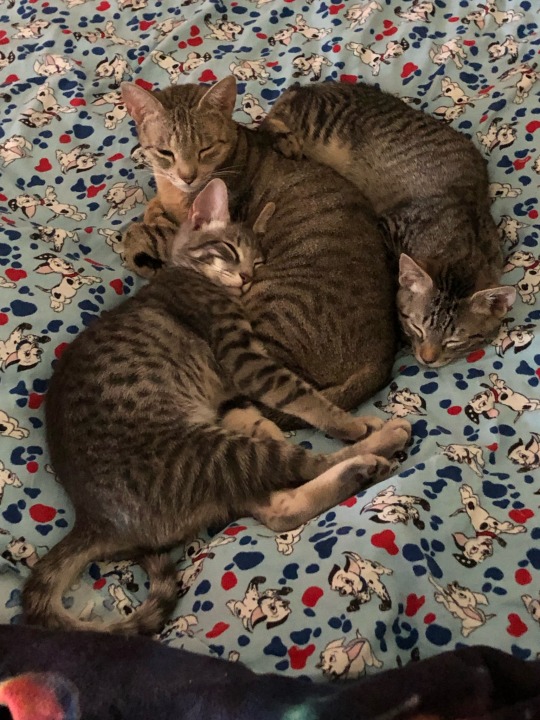
OK SO.
here's the thing. so far i have been OBSESSED with all the little ways each chapter had broken their own tropes
the shinobi chapter that has the pacifist/genocide option (iirc toby cited this game as inspo)
the distant future chapter where you're expecting the muscle butt space marine to be a total hardass, but he's compassionate to a grieving woman and is muscling through past trauma to do what he can to make sure everyone gets home alive
baiting your opponents into attacking you in the present day chapter, because that's how your learn irl is from watching
picking which character lives in the shifu chapter
i could go on
but listen
nothing
NOTHING could have prepared me for chapter 8.
i thought i was gonna not like it, cuz generic medieval fantasy stuff bores me (i remember being disappointed when i learned that was the 8th chapter after i got to be a cowboy and an unga bunga and Literally A Spaceball
but the subtle storytelling in this chapter is making me lose my mind
when Oersted get japed by the lord of dark, the fight with the shadow in the throne room is already good cuz it never attacks you. it actively runs from you. (cuz it's actually the king)
and after he's kicked out, you're given radar pointers. no sense of direction. you're completely alienated and on your own and left to wander, seeking purpose. after being held on a pedestal and then having everything from him, you get the sense of isolation, especially when you keep encountering waves and waves of soldiers
then when you give up and start fighting back cuz you're tired of running, when your enemies survive your initial attacks, they're afflicted with the Terror status condition. even though none of Oereo's (calling him that now cuz im lazy) attacks have that ability. the guards are scared of HIM. not is attacks.
and when you go back to Archon's Roost, new enemies start appearing that weren't there before. and they're all named after phobias.
lil Oereo is suddenly confronted with these fears now because he's alone. when he had a purpose and his comrades, he wasn't bothered by these fears. but now he's insecure and they're creeping in
and it's especially telling when you know how this ends, and the famous pathway that Fear Leads to Hate.
which also makes me wonder; did he always have the capacity for this? Oereo has been shown to be a standard silent protagonist, but also prone to violent reaction (as he almost attacked the guards when accused of the king's murder)
and you can hear the hesitation in Alethea's voice after they're married (this may be partly cuz she was married off by her dad to whoever was best in combat), and with one of the end chapter bosses originally being named Gynophobia (fear of women), it makes me wonder
did Oersted always have the capacity for evil and it was just exploited, or was his fall so hard because he was promised so much? it's possible it's a little of both
anyways, i'm finishing up chapter 8 now, no spoilers for chapter 9 if you read all this way for some reason
i just had to ramble about this, i'm sorry, the subtle storytelling is just so SO good.
31 notes
·
View notes
Text
TheEnigma21's avatar
TheEnigma21·5/3/2021
in General
Psychological Diagnoses of Multiple Characters
Jonathan Joestar - PTSD
Dio Brando - Antisocial Personality Disorder (Sociopathy), Intermittent Explosive Disorder, and Mythomania
Erina Pendleton - PTSD
Speedwagon - PTSD and Social Anxiety Disorder
Will A. Zeppeli - Schizotypal Personality Disorder and PTSD
George Joestar I - Obsessive Compulsive Personality Disorder (another name for this personality disorder is "Anankastic Personality Disorder" and this disorder should not be confused with obsessive compulsive disorder, which is an anxiety disorder) and PTSD
Poco - Conduct Disorder
Straizo - Gerontophobia
Bruford - PTED
Tarkus - Antisocial Personality Disorder (Sociopathy) and Intermittent Explosive Disorder
Wang Chan - Antisocial Personality Disorder (Sociopathy)
Dario Brando - Narcissistic Personality Disorder (Malignant Narcissism) and Alcohol Use Disorder
Jack the Ripper - Antisocial Personality Disorder (Sociopathy) and Gynophobia
Doobie - Antisocial Personality Disorder (Sociopathy)
Elizabeth I - Narcissistic Personality Disorder (Malignant Narcissism)
Elizabeth/Lisa Lisa - PTED
Joseph Joestar - Histrionic Personality Disorder (somewhat on this disorder's spectrum), Oppositional Defiant Disorder, and PTSD
Caesar Anthonio Zeppeli - Antisocial Personality Disorder (Sociopathy), PTED, and Entomophobia
Rudol von Stroheim - Antisocial Personality Disorder (Sociopathy)
Smokey Brown - Conduct Disorder
Kars - Antisocial Personality Disorder (Sociopathy) or Narcissistic Personality Disorder (Malignant Narcissism) and Anthropophobia
Esidisi - Antisocial Personality Disorder (Sociopathy) and Anthropophobia
Wamuu - Antisocial Personality Disorder (Sociopathy)
Santana - Antisocial Personality Disorder (Sociopathy)
Donovan - Antisocial Personality Disorder (Sociopathy)
Wired Back - Antisocial Personality Disorder (Sociopathy) and Gynophobia
George Joestar II - Dependent Personality Disorder (formerly during childhood)
Adolf Hitler - Narcissistic Personality Disorder (Malignant Narcissism), Substance Use Disorder, Xenophobia, Homophobia, Transphobia, and Able-phobia (if there is such a word to mean fear of people with disabilities)
Jotaro Kujo - Schizoid Personality Disorder and PTSD
Jean Pierre Polnareff - PTED and Compulsive Sexual Behavior
Iggy - Conduct Disorder, and Binge Eating Disorder
Holy Kujo - Dependent Personality Disorder (maybe?)
Anne - Obsessive Love Disorder
Enya the Hag - Antisocial Personality Disorder (Sociopathy) and PTED
Vanilla Ice - Antisocial Personality Disorder (Sociopathy) and Intermittent Explosive Disorder
N'Doul - Antisocial Personality Disorder (Sociopathy)
Oingo - Antisocial Personality Disorder (Sociopathy)
Boingo - Narcissistic Personality Disorder (Covert Narcissism)
Anubis - Antisocial Personality Disorder (Sociopathy)
Mariah - Narcissistic Personality Disorder (Sexual Narcissism)
Alessi - Antisocial Personality Disorder (Sociopathy)
Daniel J. D'Arby - Narcissistic Personality Disorder (Malignant Narcissism) and Compulsive Gambling
Telence T. D'Arby - Narcissistic Personality Disorder (Malignant Narcissism)
Pet Shop - Antisocial Personality Disorder (Sociopathy)
Nukesaku - Narcissistic Personality Disorder (Covert Narcissism)
Gray Fly - Antisocial Personality Disorder (Sociopathy)
Impostor Captain Tennille - Antisocial Personality Disorder (Sociopathy) and Hydromania
Forever - Antisocial Personality Disorder (Sociopathy), Compulsive Sexual Behavior, and Pedophilic Disorder
Devo the Cursed - Antisocial Personality Disorder (Sociopathy)
Rubber Soul - Narcissistic Personality Disorder (Malignant Narcissism)
Hol Horse - Narcissistic Personality Disorder (Malignant Narcissism)
J. Geil - Antisocial Personality Disorder (Sociopathy)
Nena - Narcissistic Personality Disorder (Somatic Narcissism)
ZZ - Antisocial Personality Disorder (Sociopathy)
Steely Dan - Antisocial Personality Disorder (Sociopathy) and Conduct Disorder
Arabia Fats - Antisocial Personality Disorder (Sociopathy)
Midler - Antisocial Personality Disorder (Sociopathy)
Chaka - Stockholm Syndrome
Wilson Phillips - Narcissistic Personality Disorder (Overt Narcissism)
Josuke Higashikata - Dependent Personality Disorder and Chelonaphobia
Yoshikage Kira - Antisocial Personality Disorder (Psychopathy) and Obsessive Compulsive Disorder
Giorno Giovanna - Autism or Asperger's Syndrome
Pannacotta Fugo - Borderline Personality Disorder (Petulant Borderline) and Intermittent Explosive Disorder
Diavolo - Antisocial Personality Disorder (Sociopathy)
Jolyne Cujoh - Oppositional Defiant Disorder
Enrico Pucci - Antisocial Personality Disorder (Sociopathy)
3 notes
·
View notes
Text
Naked Lunch: Burroughs
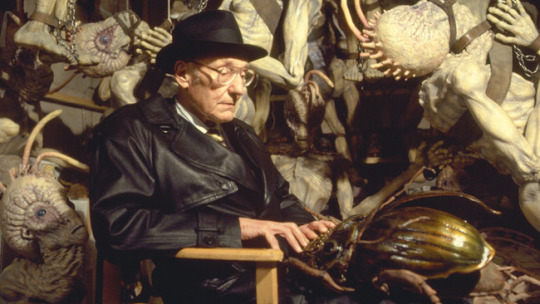
This essay by novelist, playwright, and culture critic Gary Indiana originally appeared in the 1992 book Everything Is Permitted: The Making of “Naked Lunch.”
Burroughs’s work tends to affect people like a Rorschach test. It separates cultural conservatives from avant-gardists, social reactionaries from libertarians. Or, to use one of Burroughs’s favorite distinctions, members of the Johnson Family from the Shits. Johnsons have a live-and-let-live, mind-their-own-business mentality. Shits have an uncontrollable need to pass judgment on and be right about everything. In today’s censorious climate, police work dominates the pages of the book reviews: this writer has the wrong attitude and must be done away with.
Burroughs has always elicited a testy response from the cultural establishment. While early support for Naked Lunch from such mandarins as Mary McCarthy and John Ciardi has been matched over the years by encomiums from many of our best writers and by a substantial body of excellent academic criticism, the overall literary world’s recognition of Burroughs has been grudging more often than not. Perhaps Burroughs’s achievement represents a threat to the well-mannered, conventionally crafted, middle-class novel. It could be as simple as that. Burroughs expanded the content of fiction, giving artistic form to extremes of contemporary abjection. Naked Lunch opened a path into the world of the addict, the homosexual, the social outlaw. From this despised and largely unmentionable territory, Burroughs extracted a presiding metaphor of control. Naked Lunch deals with the control of consciousness and behavior through addiction—to sex, power, money, drugs, even to control itself. When themes of this nature, which ultimately have to do with politics, lie at the heart of a writer’s work, appreciation is often checked by the timidity of those who prefer not to think about such issues.
Burroughs also revolutionized the structure of fiction. He opened the novel to chance operations, using the “cut-up” and “fold-in” techniques he had developed with Brion Gysin and Ian Sommerville. Earlier writers, like Conrad, sometimes bring the same characters from one novel to the next. Burroughs recycles phrases, “routines,” descriptions, and characters through successive works as if they were musical figures or colors in a paint box. His novels suggest an artful arrangement of blocks of prose rather than linear compositions. Naked Lunch and the successive books mined from the thousand-some pages Burroughs produced while in and out of heroin addiction in the 1950s—Nova Express, The Soft Machine, The Ticket That Exploded (and, recently exhumed, Interzone)—compose, in advance of postmodern theory, the first truly postmodern literary texts. Eliminating classical armature and syntax, these books embrace the fragmentary, the “incomplete,” the deconstructive.
No doubt the unconventional approach taken by this work inspires nightmares of literary anarchy—what if everyone started writing this way or started writing about what Burroughs writes about? This two-pronged assault on traditional fiction came as the third and arguably furthest-sweeping wave of the Beat movement, after Ginsberg’s Howl and Kerouac’s On the Road. These set a generation in motion and helped spawn the sixties counterculture. Burroughs deserves consideration apart from the Beats, but there is no doubt that Naked Lunch seemed, on publication, the literary apotheosis of that movement. One obvious difference between Naked Lunchand Beat literature is what Mary McCarthy called Burroughs’s aerial perspective. Long exiled from the United States—in Mexico, Peru, France, and Morocco—Burroughs takes a long, jaundiced, global view of things. His evocation of America, though suffused with a gelid sort of nostalgia for the sexual dawn of adolescence, lacks entirely the provincial romanticism found in much Beat writing. (Problematically, much of Burroughs’s work does share the Beats’ extreme gynophobia; one can only defend his remarks about women in The Job by noting the misanthropy in his writing overall.)
In any event, Burroughs’s absence from the United States during much of the Beat era and the subsequent hippie movement encourages us to link him with British pop art as well as the Velvet Underground, with Godard’s Alpha 60 as well as Wild in the Streets. At this distance, it’s tricky to separate quintessentially “Burroughsian” ideas from ideas that were generally in the wind in the sixties. Widespread disgust with and revolt against the gray cold-war conformity of the 1950s was certainly fueled by the Beats and a constellation of associated writers and artists. Strategies of transcendence and escape flowed from such disparate sources as Marxist theory and LSD. Linguistics, along with comparative anthropology, became a countercultural preoccupation. Nonverbal communication loomed as a great undiscovered continent; the nature of the prelinguistic brain was much speculated about. These crypto-scientific interests of the radical young, which existed alongside a vogue for Eastern mysticism and magical operations, coincided with Burroughs’s artistic and personal quest for a “breakthrough in the gray room.” A radical interrogation of language permeates his books. As we can see from variously reproduced pages from Burroughs’s scrapbooks, his word-and-image experiments closely parallel certain contemporaneous artifacts, like Eduardo Paolozzi’s silk-screen series Moonstrips Empire News (itself inspired by Wittgenstein’s Philosophical Investigations) and slightly later work by Joseph Kosuth. (Burroughs has collaborated, both visually and verbally, with Robert Rauschenberg, David Hockney, George Condo, Philip Taaffe, and Keith Haring; in recent years, he’s been enjoying a second career as a painter.)
Burroughs has always written for the space age. His work addresses readers who want out of present slave-planet conditions. His theory of language as a virus is closely connected to an (ambivalent) repudiation of Western consciousness in favor of “the savage mind.” (This theme, a favorite of sixties culture, is deftly conveyed in Barbet Schroeder’s film The Valley [Obscured by Clouds].) In the tense-scrambled, oneiric narratives of Nova Express and The Ticket That Exploded, Burroughs invokes the synchronic, telepathic mind of the aboriginal, linking the hieroglyphic “Mayan control calendar” with the image manipulation of contemporary mass media. Other texts, exploring the mind-altering possibilities of Korzybski’s general semantics and the Scientology E-meter, read like manuals for dismantling prerecorded consciousness. Burroughs’s basic project is psychoanalytic: to discard imprints, received ideas, the residue of psychic wounds, all forms of false consciousness. Since he pictures liberation as a state of tranquillity and “mineral silence” rather than one of religious or sexual ecstasy, this goal seems close to Freud’s ambition to replace neurotic unhappiness with ordinary unhappiness.
Being a novelist instead of a theoretician, Burroughs invariably paints the catastrophic possibilities inherent in any scheme of liberation. His pointed refusal to endorse “the garden of delights” of the psychedelic movement, though widely ignored at the time, reflects the stubborn complexity of a born realist. A strain of solid common sense serves as a bracket around writing uncommonly open to the apocalyptic imagination. It’s difficult to pinpoint the precise amount of put-on in the dozens of texts Burroughs contributed in the sixties and seventies to English and American underground newspapers, describing methods for instigating riots and disrupting the urban infrastructure. The chill-blooded revolutionary stance is seldom struck without irony; prescriptions for poisoning water supplies or launching biological warfare often turn up later as “routines” in Burroughs’s fictions, like The Wild Boys and Blade Runner (a movie). Nevertheless, it’s worth remembering that between roughly 1967 and 1973, the mood of much of the West was apocalyptic; authentic populist movements really did threaten the control mechanisms of the media-military-industrial complex, for the first and only time since World War II. Burroughs’s writings were part of a seminal, restive cultural mix that included Herbert Marcuse, N. O. Brown, Frantz Fanon, Claude Lévi-Strauss, and Marshall McLuhan—which in turn influenced such musicians as John Cage and La Monte Young; diverse artists, including R. B. Kitaj, Rauschenberg, Yoko Ono, and Jasper Johns; numerous theater directors, such as Jean-Claude van Itallie, Joseph Chaikin, and Julian Beck; innumerable writers; and filmmakers Nicolas Roeg, Ve?ra Chytilová, Alejandro Jodorowsky, the Godard of One Plus One and Weekend, and the Pasolini of Pigpen, to name only a few.
Burroughs has remained an influential figure throughout the last two decades, partly on the strength of later [books] like Exterminator!, Port of Saints, Cities of the Red Night, The Place of Dead Roads, and The Western Lands, in which earlier experimental procedures have been integrated into more traditionally coherent narratives. Another part of Burroughs’s appeal, especially to younger readers, is the prophetic aura of his books. Naked Lunch, for example, refers ahead twenty years to liposuction (“stomach tucks”), autoerotic asphyxia, and a fatal AIDS-like viral epidemic. Some of his writing is uncanny in this respect. Some of it simply identifies problems that recur and magnify themselves historically—for example, drug hysteria, a relatively minor tool of social repression in the 1940s and 1950s, today a major implement of state terror. The “purple-assed baboon” routine, used in “Roosevelt After Inauguration” to satirize Roosevelt’s attempt to pack the Supreme Court, also anticipates the neoconservative takeover of the American judiciary in the 1980s and 1990s.
The culture has absorbed many of Burroughs’s ideas so thoroughly that their source is now obscured. A conspiratorial view of government didn’t originate with Burroughs, but he was the first American novelist to make justified paranoia a major literary theme. The idea of sinister forces controlling the world of appearances is commonplace in post-Watergate, post–Iran Contra America, but it was considered bizarre and unseemly when Burroughs invented the Nova Mob.
The pitch-black humor and rejection of humanism in Burroughs’s works were naturally embraced by the punk movement, notably by Patti Smith. In the distinctly unpsychedelic and junk-ridden milieu of downtown Manhattan in the late seventies, Burroughs was elder statesman, guru, and cautionary presence all in one. It would be foolish to claim that the strong antijunk message of Naked Lunch ever dissuaded a single junkie, or indeed was ever intended to. Both the courtroom transcripts from the 1966 Boston obscenity trial and Burroughs’s “Deposition: Testimony Concerning a Sickness” that preface all later editions of Naked Lunch serve exactly the same satirical purpose as the frontispiece disclaimers and pledges of high moral altitude that accompany any picaresque novel out to shock, from Defoe’s Roxana to Nabokov’s Lolita. In the seventies, Naked Lunch was to junkies what Alice in Wonderland and The Hobbit were to acidheads in the sixties. In other words, a completely accurate guide to what you could expect if you got addicted to heroin. In the days before AIDS, many people wanted, for reasons of their own, to go through hell and (maybe) live to tell about it. Burroughs’s writings were useful in the sense that reading them kept you from being too deluded about what you were doing.
The extravagant homoeroticism of The Wild Boys and Cities of the Red Nightechoes in the films of Derek Jarman, which also employ the aleatory cutting techniques of Burroughs’s fiction. The device of anachronism in Cities of the Red Night—a formally tidy variant of the “time travel” produced by scrambled texts in earlier works—crops up in Jarman’s Caravaggio, Rudy Wurlitzer and Alex Cox’s film Walker, and a recent novel by William Gibson and Bruce Sterling, The Difference Engine. Burroughs’s literary influence on Kathy Acker, Dennis Cooper, David Wojnarowicz, and myself is as various as we are and probably something for others to elucidate.
Repetitive variations of the cut-up method using tape recorders and film, investigated by Burroughs in collaboration with Ian Sommerville and Antony Balch, have been adapted in music by Philip Glass, Gavin Bryars (the looping in The Sinking of the Titanic, in particular), and Glenn Branca (Symphony no. 2), among others; groups like the Insect Trust, Steely Dan, Hüsker Dü, and Throbbing Gristle have named themselves out of Naked Lunch and/or applied Burroughs’s techniques of composition. Burroughs has made numerous recordings combining readings of his work with experimental music, including the highly successful Dead City Radio, as well as other recordings made in collaboration with Giorno Poetry Systems. He recently collaborated with Robert Wilson and Tom Waits on The Black Rider, a music drama. Though imperfectly realized, the picture-book projects Ah Pook Is Here and The Book of Breeething were sufficiently well-known to have informed the recent outgrowth of “graphic novels”—grown-up comic books by such serious writers as Clive Barker and Michael Moorcock, intended to catch the short, primarily visual attention span of the TV-and-Nintendo generation.
The question of how Burroughs’s themes, characters, and ideas might be communicated to a wider audience remains complicated in 1991. Because certain important aspects of the work—explicit homoerotica and homoerotic violence, defecatory fantasies, etc.—are not only controversial but banned from mainstream film and from television, Burroughs’s mythology for the space age has “entered the mainstream” at an oblique angle. Religious hysteria surrounding the depiction of sexuality and bodily functions is a depressing, near-universal fact of life today. However, it would be insultingly reductive to suggest that Burroughs’s achievement consists entirely in his exemplary frankness about sucking and fucking. His invention of alternative worlds, of creatures like the Mugwumps, the Green Boys, and the Nova Mob, and of archetypal characters like Bradley the Buyer, A. J., the Afterbirth Tycoon, Hamburger Mary, and Dr. Benway represents a protean effort of imagination. Some of Burroughs’s complex insights into the social dynamics of addiction—and a good deal of Burroughsian humor—were incorporated into Gus Van Sant’s Drugstore Cowboy, a film that features Burroughs as a defrocked junkie priest. Though Ridley Scott adopted the title rather than the story of Burroughs’s Blade Runner, the movie’s cast of renegade androids and its bosky, evocative ambience—Piranesian architectural and human ruins outscaled by the monolithic “Mayan pyramids” of the corporate future—belong to Burroughs’s fictional world, as does the device of Scott’s Alien, i.e., a parasite that eventually consumes and assimilates its host organism. Among major filmmakers, it’s undoubtedly David Cronenberg, now director of the movie Naked Lunch, whose imagination most closely parallels Burroughs’s own. The lethal telepathic practices of Scanners, TV-induced brain tumors and “organic” videocassettes in Videodrome, fatal symbiosis between twins in Dead Ringers, and even—especially—the disembodied gallbladder that swims up between Barbara Steele’s legs in [Shivers] correspond to the queasily visceral marriages of flesh and technology pioneered by Naked Lunch, The Soft Machine, and Nova Express. More pertinent still is the crisply detached “paranoid realism” practiced by both artists: the sense that every human interaction contains the possibility of homicide. Or, as the title of Alan Ansen’s 1959 essay on Burroughs put it, “Anyone Who Can Pick Up a Frying Pan Owns Death.”
— Gary Indiana
Gary Indiana is the author of many novels and works of nonfiction, including the BFI monograph Salò, or The 120 Days of Sodom.
#William Seward Burroughs II#william s. burroughs#Burroughs#Naked Lunch#Gary Indiana#The Criterion Collection
24 notes
·
View notes
Text
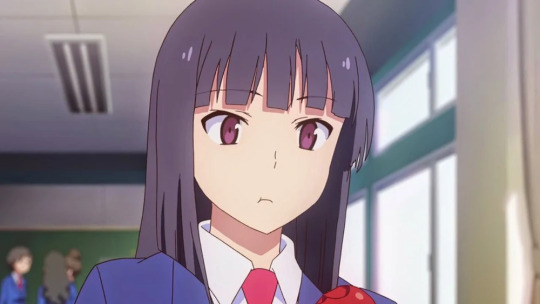
Today’s disabled character of Ryunosuke Akasaka in The Pet Girl of Sakurasou, who has hikikomori syndrome and gynophobia
Requested by Anon
[Image Description: Drawing of boy with long black hair and purple eyes. He is wearing a blue over coat, white button up, and red tie. He is also eating something red.]
#hikikomori syndrome character#gynophobia character#The Pet Girl of Sakurasou#The Pet Girl of Sakurasou ryunosuke#Ryunosuke Akasaka#disabled character of the day
8 notes
·
View notes
Note
Londrekia
Sexuality Headcanon:
Even without his very apparent gynophobia he'd still be gay I think. Ace too maybe because why not
Gender Headcanon:
Trans guy but literally nobody knows about it for obvious reasons
A ship I have with said character:
oh, you know
A BROTP I have with said character:
I think he and Lex should actually be friends!
A NOTP I have with said character:
every woman in the game lmao
A random headcanon:
Has anxiety just like me for real
General Opinion over said character:
He's an interesting guy that I enjoy overanalysing and loathe drawing
3 notes
·
View notes
Text
Phobias
by CheeseAndCake
Streibough is followed by four demons.
(A lie. He is followed by many more, but there are four he is willing to admit to.)
Words: 1097, Chapters: 1/1, Language: English
Fandoms: Live A Live (Video Game)
Rating: General Audiences
Warnings: Creator Chose Not To Use Archive Warnings
Categories: Gen
Characters: Streibough (Live a Live), Claustrophobia (Live A Live), Scotophobia (Live A Live), Acrophobia (Live A Live), Gynophobia | Hydrophobia (Live A Live)
Additional Tags: Streibough is a bundle of issues, but what else is new, I throw a theory onto AO3 as a fic, "The Phobias are Straybow's fears" theory
from AO3 works tagged 'Live A Live (Video Game)' https://ift.tt/C0ZWp8M
2 notes
·
View notes
Text
no okay full offense purposefully designing a character to be androgynous only to make a big reveal that they’re actually female as a gotcha-moment for another character with gynophobia (fear of women) to force him to get over said phobia (AND trauma) feels really fucking awful. like??? you don’t have to fix him especially in a franchise where the main antagonists are dominantly women with corrupted supernatural powers.
2 notes
·
View notes
Text
Very loose thoughts for a modern verse for specific characters because some of them are still being difficult. Might tweak some of this but we’ll see. I did consider name changes for some characters but now I’m just like ‘Nah. Just go with it.’
As said above, some might get tweaked. But for now this is what I have! Under the cut because this got long.
Chloe - The daughter of a wealthy family who had to witness her parents killed in front of her when her family was robbed. She didn’t have any close family remaining nearby when her parents died, so was sent to live with distant and emotionally cold members that were left. They acted somewhat warmly to her at first but she knew that behind her back, they would ridicule her and shame her for not upholding the family name. Even though she was twelve at the time of her parents’ deaths. Due to the high amount of competitiveness of the high society she grew up in, and no one left in Chloe’s family capable of running the business they spent their lives establishing, the name was tarnished irreparably and the business fell apart. Cut to years later and Chloe is seventeen now. Though Chloe is still just in high school, about to go to college, she wishes for a way to reclaim honor for her family in whatever way she can.
Jay - Was abandoned by his birth parents when he was a baby and got taken in by a manipulative, abusive man named Solon who sought only to use him as a tool in his criminal schemes. Jay was abandoned by him when a mission to kill a target of theirs went wrong. He was left to die. He winds up rescued by a trio of brothers (Pippo, Poppo, and Quppo, or Piers, Porter, and Quincy as they’re known for this verse) and, once nursed back to health, finds himself adjusting to having a somewhat normal life after they adopt him officially. For the most part, with the help of his new adoptive family, he becomes much more adjusted. But he still grapples with lingering trauma from what he went through while living with Solon.
Walter - The son of a military based family, interested in enrolling himself since that's the sort of life he's always known. He's used to moving around a lot and doesn't have a lot in the way of friends. Interested in robotics to a degree, and most interested in aquatic life. Not the most approachable of boys, but to those he does let in Walter at least tries to be friendly. Did have a near death experience at one point, but recovered.
Tear - The younger sister of Van, raised by him not long after her birth due to their mother dying from complications and their father being out of the picture. She lives a relatively simple life, and is homeschooled, so is a bit on the awkward side and has a hard time making friends. She’s very interested in studying music, singing in particular.
Guy - The heir to a wealthy family that was thought to have been lost when the rest of his family was killed. He was saved by his older sister during the tragedy, but she also was killed and Guy lost his memories of the event. The trauma from that day left him with gynophobia and the memories of what exactly happened were lost. He was sent to live with friends of the family and grew up not far from Asch and Luke’s family. Though he didn’t get along with Asch, he did eventually build a friendship with Luke that he tried to maintain after he went to college. Now he works at a local coffee shop while finishing up college. One day he hopes to put his degree to use as a mechanic or getting to work with technology in general.
Sync and Ion - Twin brothers, Sync being slightly older than Ion. Ion is much more frail and sickly compared to his older brother. Though their parents claim not to have favorites, it’s easy to see that Ion is the preferred twin in some cases. Ion isn’t particularly happy with this arrangement, but still does his best to please their parents and works hard. He doesn’t have a ton of friends apart from a girl a year younger than him who makes it kind of her duty to protect him (Anise). Sync knows he’s not the favorite but by this point doesn’t care and just kind of does whatever. He’s very much in his angsty teen stage.
Asch - Luke’s older twin brother. They used to be close when they were younger, but a lot more expectations were placed upon Asch than Luke and he grew a bit angry and frustrated in general because of it. He’s pretty closed off when it comes to his family, with the exception of his mother to some degree. It doesn’t help that their father is equally cold toward Asch in an attempt to make him the best that he can be.. His one soft spot remains Natalia, his childhood friend and crush.
Mieu is probably the pet chinchilla of Luke and Asch’s family idk.
Jade - A child prodigy who graduated college at fifteen and went into the military. He eventually was discharged due to running human experiments, which were very prohibited, and became a bodyguard for a young diplomat/royal from another nation named Peony. He spends his days primarily guarding Peony, and some part of him regrets the things he did while in the military. Making up for those things isn't easy, of course. So he just carries on with life. Bearing that weight and knowing he can't ever really erase what he did.
Rita - A child prodigy, already a freshman in college despite just turning fifteen. She’s thought of as the weird genius girl and is ostracized by a lot of her peers both for being as young as she is and for preferring her robotics and technology studies. Rita’s fine with this, though. She trusts her studies and her technology much more than she does people since they’d never abandon her. She lost her parents and was raised by rather distant relatives who didn’t care too much for her.
Raven - A sort of shady man who is difficult to pin down in terms of livelihood. He seems to go to and fro, never really staying in the same place for too long. Has a history of being in the military, but keeps it to himself. That life nearly cost him his life, and it was only thanks to medical science that they were able to save him. No one's ever really sure what he's doing or who he looks out for other than himself. He does have a good heart, of course. It's just his shadiness that puts people off.
Hubert - The younger brother of Asbel, and formerly a part of a relatively happy family. A messy divorce led to the family splitting apart. Asbel wound up running away from home, going to live with a distant friend in the big city, while Hubert was put up for adoption. The tumultuous time left Hubert shaken, but he was made to adjust quickly with his new family. His new family, the Oswells, was very strict and didn’t accept his being a crybaby when he first came to them. He became a young man who was moulded to never accept anything less than success, and he grew to resent his birth family to a degree. He’s also a nerd still, but is easily embarrassed about revealing that side of himself to just anyone.
Sophie - A young girl who lost her memories that lives with Asbel's family. She's most interested in all things floral, and has a deep friendship with Asbel and Hubert both along with Cheria and another childhood friend of theirs in the form of Richard. But things became awkward after Asbel's family divorced. She lives with Asbel and hardly ever sees Hubert due to the circumstances. She just wants everything to be somewhat normal again.
Jude - Comes from a family of doctors and is very much a people pleaser still. Also a child prodigy, but due to how busy both of his parents are he tends to spend a lot of time with his childhood friend Leia. Due to working as hard as he did in school, he was able to skip a few grades and ends up with a full scholarship to a prestigious medical school. He intends on becoming a better doctor than his parents. He is... not great at self care at the best of times, both due to studying a lot and taking care of people around him when he can.
Ivar - A local college student who works at the local animal shelter. He takes his duties very seriously and is well loved by the animals he works with. Doesn’t know Jude as of this point in time. He also takes self defense classes and is very invested in learning about history in particular. Kind of condescending when he thinks he knows more than the people around him, but also easy to torment.
Ludger - A culinary school student raised by his older brother after he lost his mother in an accident of some sort. He helps look after the family cat, Rollo, and has a YouTube channel where he posts his favorite recipes. Mostly tomato related dishes. He also babysits a girl who lives in the neighborhood named Elle, mostly because her father almost always is away of business of some sort. What sort? He doesn’t know and never bothers to ask since he is paid well for looking after Elle.
Edna - Eizen’s little sister, taken in when she was very young. She naturally lives with him and thinks the world of him. Though she does think her brother is a bit weird, she loves him to death. She does think he can be something of an idiot sometimes, though, and sometimes has to call him out for being dumb. Eizen's job often leaves him away from home, leaving Edna to be looked after by her babysitter Theodora and, on occasion, Theodora's boyfriend Zaveid. Who may or may not also have a thing for Eizen. Edna doesn't like being separated from her brother as often as she is, but accepts it because she treasures the times they do get to be together.
Alisha - The bastard daughter of a wealthy man and a poor woman. Since her mother couldn’t afford to look after her, she was given to her father and taken in with open arms. She is technically the heir to his estate, but due to the circumstances of her birth she is viewed scornfully by a lot of people with the exception of her father (surprisingly). She studies hard at college and hopes to one day help her father with the family business. She also takes Maltran’s self defense class as one of her college classes.
Eizen - A sailor who typically wants nothing more than to do what he can to support himself and his sister. He didn’t originally plan on being a brother, but took in Edna when their mother died due to birth complications. Their father, of course, was out of the picture. Eizen also seems to have streaks of bad luck rather frequently and is a bit of a history nerd. Some of the people he works with don’t seem to be the best people, but he won’t confirm or deny this if asked. He just wants to take care of his sister no matter who he works with. He typically is away from home for long stretches of time since his work requires him to be on a boat more often than not. He hates being separated from Edna, but has to do what he can. Money can't just appear, after all.
Magilou - A local college dropout who is rumored to have once been a part of a very rich, well to do family. It’s also rumored she’s actually magical, as strange occurrences have been connected to her. But she’ll never tell one way or the other. What she will say is that she’s a very practiced magician and is free as can be. She lets the wind carry her, so to speak, and guide her course of action. If that means bringing a little bit of mischief to everyone’s lives, she will. In all seriousness, though, she once belonged to the especially powerful and wealthy Mayvin family. But she tired of that sort of life and left it behind with only her pet pug Bienfu, the clothes on her back, and a bit of cash in tow.
Aegis - A former college student wrongfully accused of being behind a massive scandal involving cheating and plagiarism, Aegis was expelled and forced to just try to live a normal life. He struggles both with making money and figuring out how to actually go about his day to day life. He’s a mess, but he’s trying his best both to do that and trying to clear his name in the hopes of returning to college someday.
Shionne - A young woman with a rare condition that makes it so she can't be touched. She's extra sensitive to touch, making it painful when she so much as brushes against someone. As a result, Shionne's life has been rather lonely. No one can get close enough to really befriend her, as she keeps the whole world at arm's length. Maybe someday she'll meet someone that could change her outlook on things, but as it stands? She's very touch starved and doesn't expect anything but pain from people.
Rinwell - After her parents died in a tragic car accident, something Rinwell blames herself for since she was having an argument with them at the time and they didn’t see the other car coming, Rinwell was sent to live with foster parents. She’s something of a bookish youth and tends to keep to herself because her high school peers think she’s weird. Really, she’s just traumatized still by what happened to her. Her only friend at the moment is the baby owl she rescued one day named Hootle. She knows sooner or later she should probably let him go, but keeps finding ways to convince herself that he’s not ready to return to the wild.
Kisara - A former military woman who served under a wealthy dignitary or royal or something man alongside her brother Migal. After her brother died protecting their charge from an assassination attempt, Kisara resigned and came to just want to live a quiet life. She looks out for the kids in her neighborhood, including Rinwell from time to time, and also spends some of her freetime fishing. Some of the locals say she’s something of the mom of the neighborhood for everyone. She doesn’t mind it.
Nazamil - A young girl who is the bastard child of a rich man and a poor woman. Since her father wanted to keep her existence a secret, Nazamil was raised in such a way to keep her hidden. He also abused her horribly, wanting to rule over her with an iron fist to make her obey. Then her father was killed one day by an enemy of his, leaving Nazamil to fend for herself. She's not sure what she'll do with herself from here. But she'll figure it out sooner or later. Surely she has to.
4 notes
·
View notes